Master of Landscape Architecture
News and Events
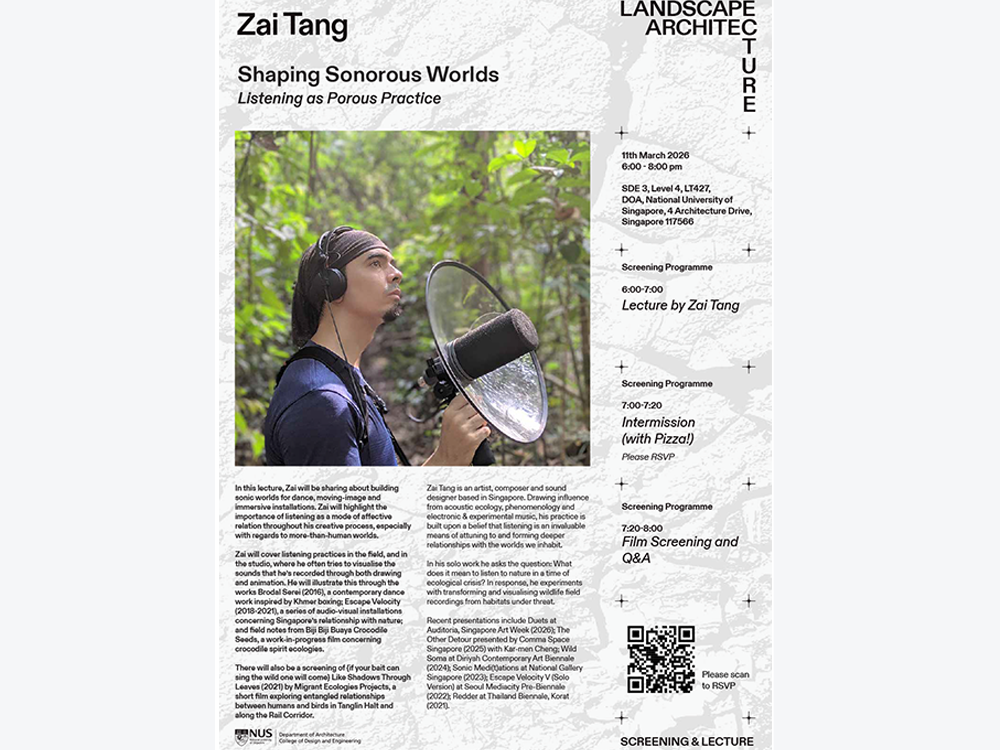
Guest lecture by Zai Tang – Shaping Sonorous Worlds: Listening as Porous Practice
Date: 11th March 2026
Time: 6:00-8:00 pm
Venue: SDE 3, Level 4, LT427, DOA, National University of Singapore, 4 Architecture Drive, Singapore 117566
Zai’s lecture explores building sonic worlds for dance, film, and immersive installations, emphasizing listening as an affective practice with more-than-human worlds. He’ll discuss field and studio listening, visualizing sound through drawing and animation, and present works including Brodal Serei, Escape Velocity, Biji Biji Buaya, and a short film screening.
Singapore-based artist, composer, and sound designer Zai Tang explores listening as a way to deepen our relationship with the natural world. Influenced by acoustic ecology and experimental music, he transforms endangered habitat recordings into sonic art. His works have featured in major exhibitions across Singapore, Seoul, Thailand, and Saudi Arabia.
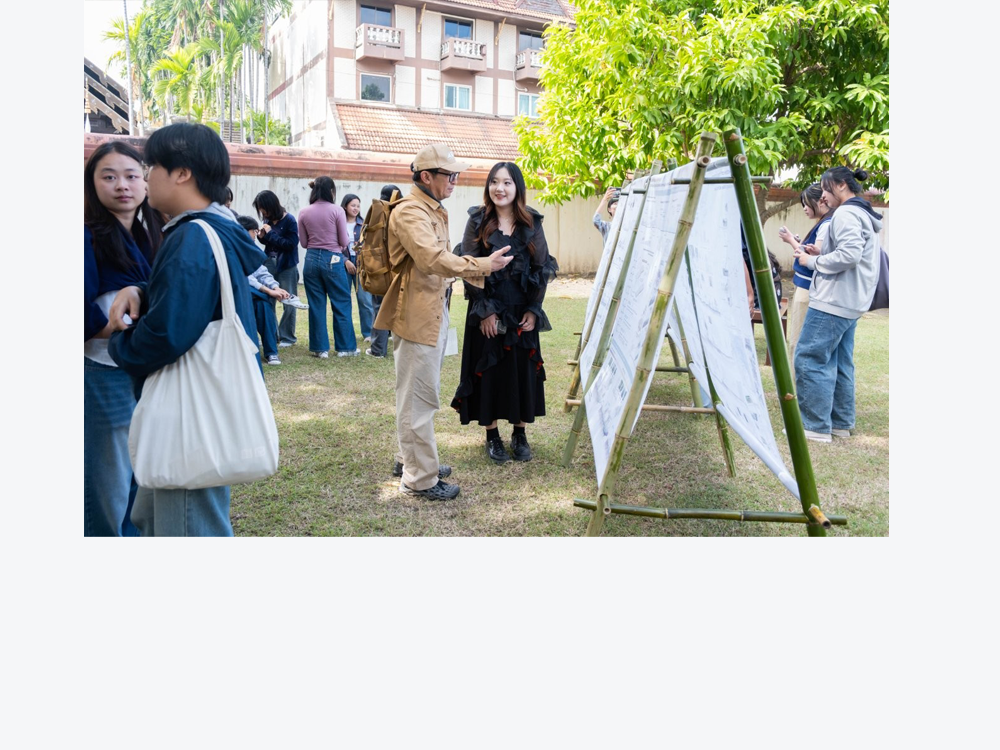
NUS MLA Exhibition Explores the Socio-Ecological Landscapes of Chiang Mai at 2025 Design Week
Students from the NUS Master of Landscape Architecture (MLA) programme presented their exhibition Politics of Conservation: Navigating the Socio-Ecological Territories of Chiang Mai at the 2025 Chiang Mai Design Week. Curated by Dr Xiaoxuan Lu, the showcase featured eleven projects exploring innovative conservation strategies amid Chiang Mai’s bid for UNESCO World Heritage status. The exhibition fostered dialogue among academics, practitioners, and the public on cultural and ecological resilience. Highlights included projects by Shruthakeerthi Karthikeyan and Lydia Li Mu, examining upland plant ecologies and flood-based communal conservation.
The exhibition was held at the Lanna Architecture Centre from December 2025 to January 2026.
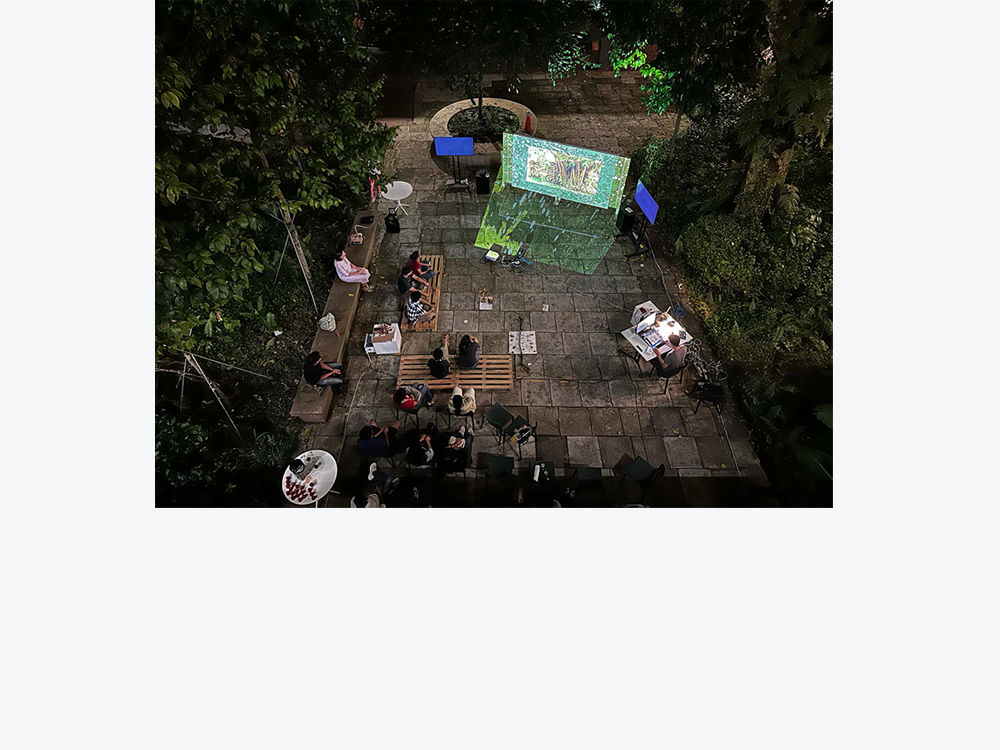
Enacting Periurban Practice
From Oct 19-22 two linked events were staged at DOA. This Will Be Something: Cinematic cartographies of the post-rural is co-produced by Victoria Jane Marshall and filmmaker, Carlos Gomez. Co-Fabricating a Garden is led by DOA alumni Ruth Chong and Tang Wei. Both events are supported by a Ministry of Education T1 grant entitled Enacting Periurban Practice, led by Victoria Jane Marshall.
This Will Be Something: Cinematic cartographies of the post-rural is performed with live editing, which means that each version is different. It was enacted twice in the Bodhi Garden (19 and 20 Oct) and once at the Grand Hall at the Department of Architecture (22 Oct) with respondent Federico Ruberto, senior lecturer DOA.
The student workshop entitled Co-Fabricating a Garden brought together students from landscape architecture and architecture. Through literary excerpts, contextualized sharing, multi-channel installation, and tactile workshops, students explored how they may see the Bodhi Garden in an alternative lens. Individually, or in small groups they created a garden element from found materials.
Please click here for more information.
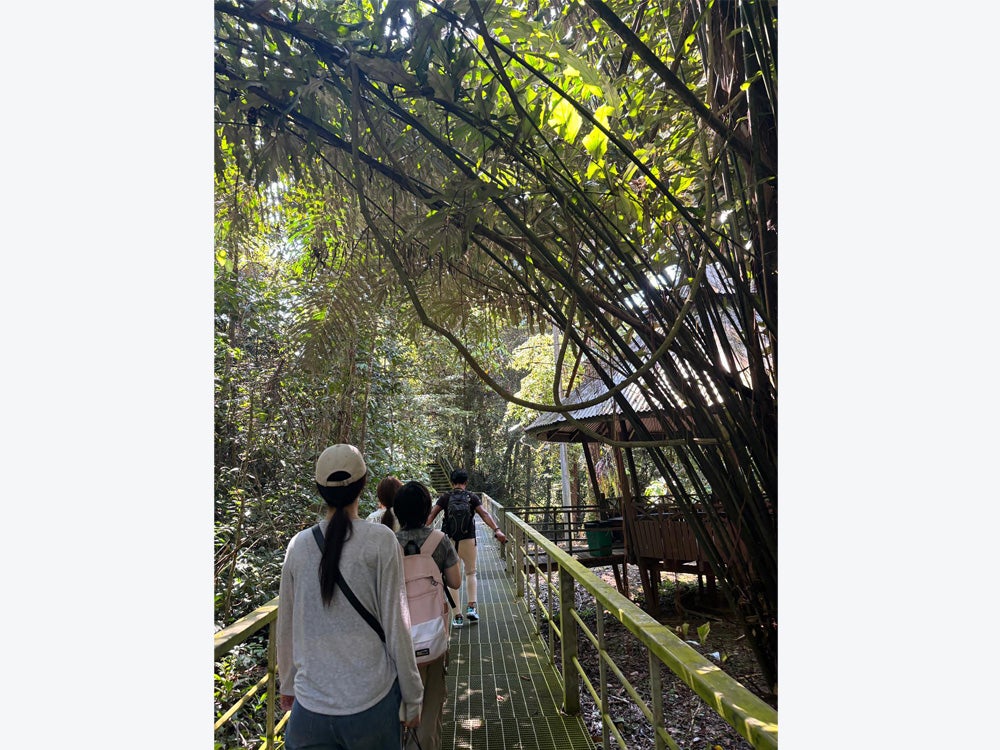
MLA Options Studio Field Report: LA5701 | MLA Studio Country: Living Currents: Reclaiming River Landscapes through Regenerative Tourism and Community Memory in Kuching, Sarawak
The Living Currents field trip to Kuching, Sarawak (September 22–27, 2025), formed part of the Master of Landscape Architecture design studio led by Casey Nai Huei Wang, exploring river regeneration, community memory, and regenerative tourism. Supported by Wendy Teo of Think & Tink, the weeklong immersive program combined urban exploration, site documentation, and participatory engagement with local partners including Tanoti Crafts and UNIMAS. Activities such as soundscape mapping workshops deepened understanding of the city’s sensory landscape, culminating in a public exhibition that connected students, residents, and professionals through design-led community dialogue.
Please click here for more information.
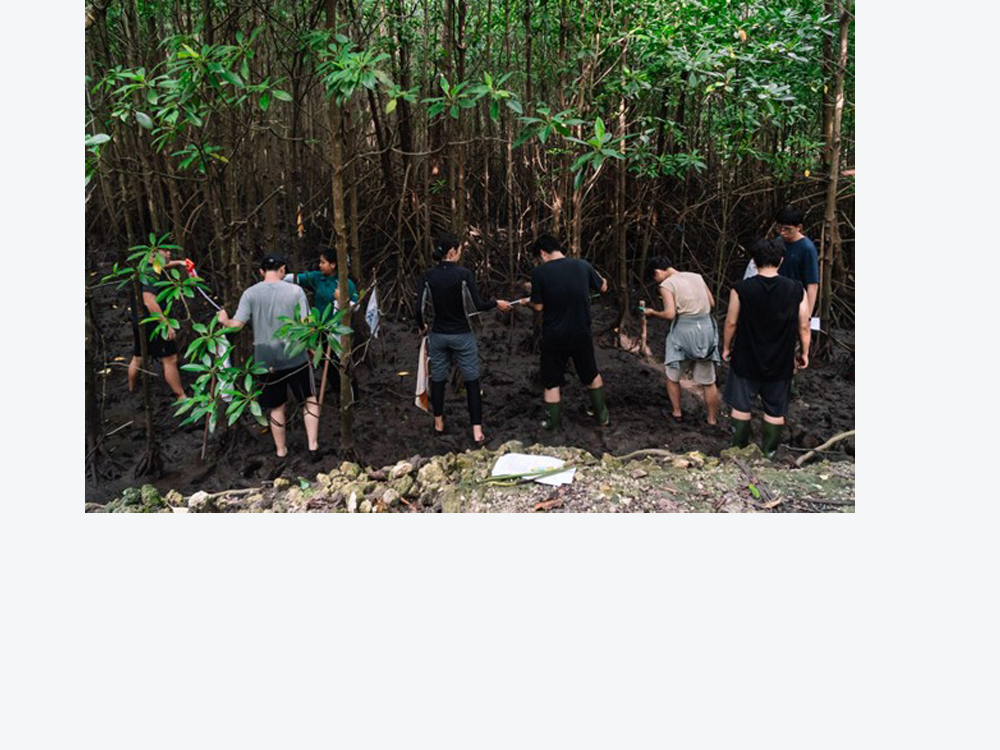
MLA Options Studio Field Report: LA5701 | MLA Studio Country: Holding Ground: Mangroves of Benoa Bay, Bali, Indonesia
From September 19–23, 2025, students from the Master of Landscape Architecture design studio, led by tutor Evi Syariffudin, conducted fieldwork in Benoa Bay, Bali. Beginning with a mangrove workshop organized by local NGO Bendega, students canoed through the Ngurah Rai National Mangrove Forest, participated in monitoring exercises, and observed village rituals. Meetings with forestry authorities introduced smart-propagation technologies supporting national restoration efforts. Site visits to Serangan Island and Tanjung Benoa deepened engagement with the Balinese philosophy of Tri Hita Karana, highlighting the intersections of ecology, culture, and design in shaping resilient coastal landscapes.
Please click here for more information.
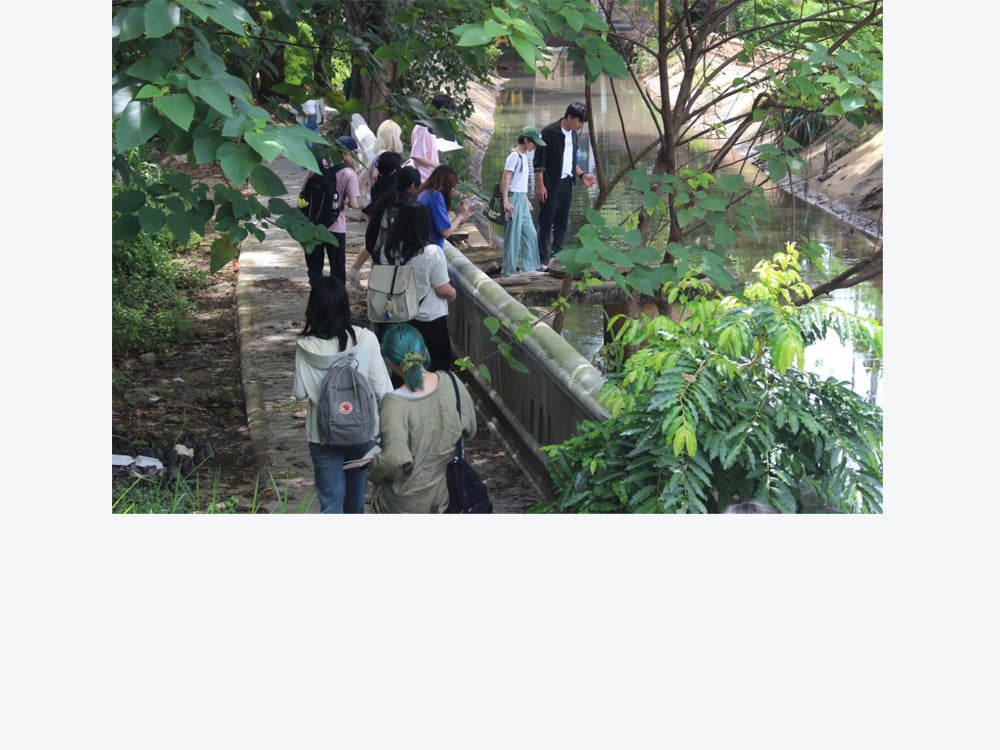
MLA Options Studio Field Report: LA5701 | MLA Studio Country: Politics of Conservation: Navigating Socio-ecological Territories of Chiang Mai
From September 20–27, 2025, the Politics of Conservation design studio, led by Dr. Xiaoxuan Lu, conducted fieldwork in Northern Thailand examining the socio-ecological and political dynamics of Chiang Mai. Collaborating with local experts including Samart Suwannarat, Chunlaporn Nuntapanich, and Dr. Warong Wonglangka, the team explored key landscapes ranging from the Mae Kha Canal to the uplands of Doi Suthep. Supported by the Department of National Parks and the Forest Restoration Research Unit, the fieldwork traversed over 1,300 meters in elevation, investigating the interplay between culture, ecology, and development amid Chiang Mai’s UNESCO World Heritage aspirations. Thai PBS documented the programme.
Please click here for more information.
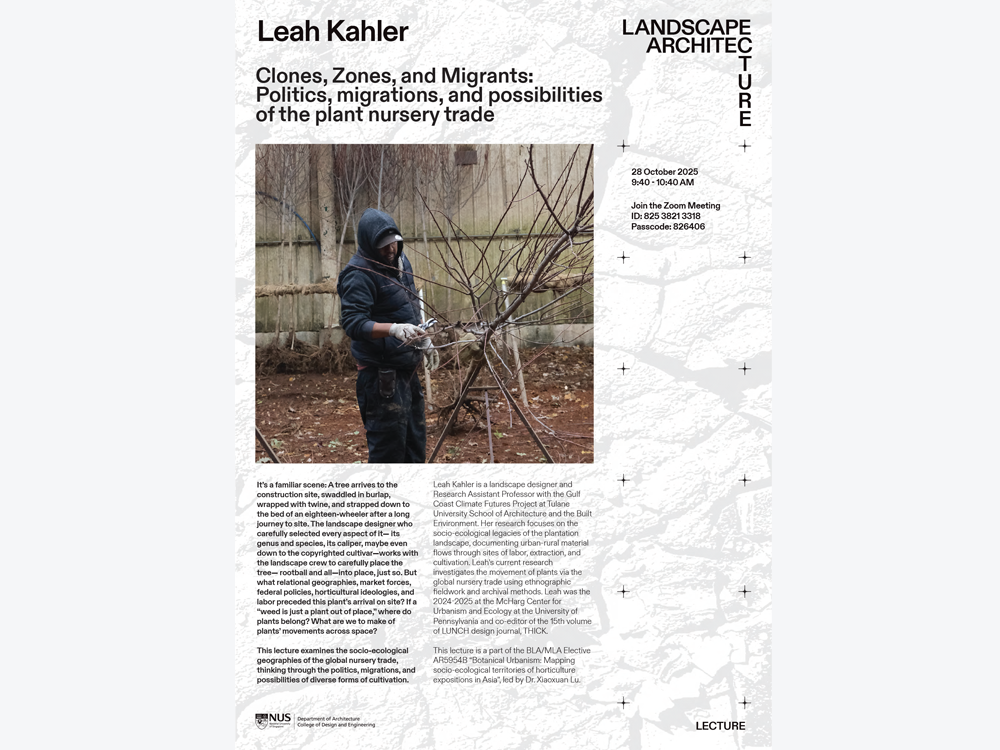
You are cordially invited to a lecture by Leah Kahler:
Clones, Zones, and Migrants: Politics, migrations, and possibilities of the plant nursery trade
Date: 28th October 2025
Time: 9:40-10:40 pm
Zoom Link: https://nus-sg.zoom.us/j/82538213318?pwd=qIF1Oe76y0cpI0nUQVwYkLEnIp5wFo.1
It’s a familiar scene: A tree arrives to the construction site, swaddled in burlap, wrapped with twine, and strapped down to the bed of an eighteen-wheeler after a long journey to site. The landscape designer who carefully selected every aspect of it— its genus and species, its caliper, maybe even down to the copyrighted cultivar—works with the landscape crew to carefully place the tree— rootball and all—into place, just so. But what relational geographies, market forces, federal policies, horticultural ideologies, and labor preceded this plant’s arrival on site? If a “weed is just a plant out of place,” where do plants belong? What are we to make of plants’ movements across space?
This lecture examines the socio-ecological geographies of the global nursery trade, thinking through the politics, migrations, and possibilities of diverse forms of cultivation.
About the Author
Leah Kahler is a landscape designer and Research Assistant Professor with the Gulf Coast Climate Futures Project at Tulane University School of Architecture and the Built Environment. Her research focuses on the socio-ecological legacies of the plantation landscape, documenting urban-rural material flows through sites of labor, extraction, and cultivation. Leah’s current research investigates the movement of plants via the global nursery trade using ethnographic fieldwork and archival methods. Leah was the 2024-2025 at the McHarg Center for Urbanism and Ecology at the University of Pennsylvania and co-editor of the 15th volume of LUNCH design journal, THICK.
This lecture is a part of the BLA/MLA Elective AR5954B “Botanical Urbanism: Mapping socio-ecological territories of horticulture expositions in Asia”, led by Dr. Xiaoxuan Lu.
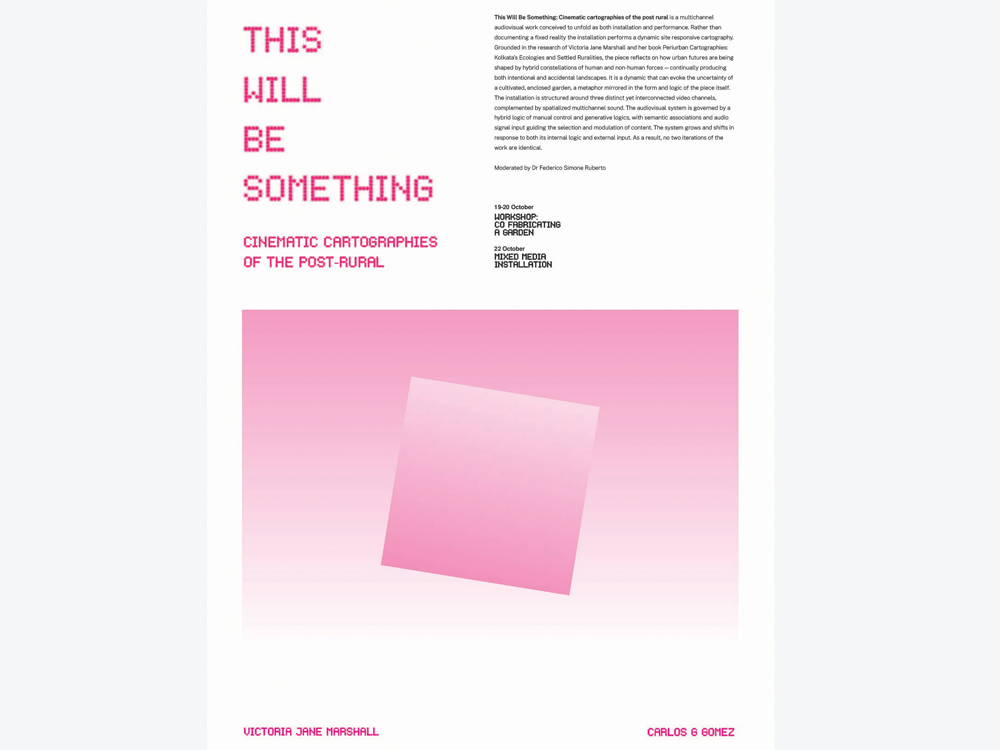
This Will Be Something: Cinematic Cartographies of the Post-Rural – Dr Victoria Jane Marshall and Carloz G. Gomez
Scene 1 – Co-fabricating a Garden Workshop
19-20 October, 2025
SDE3 Level 2 Bodhi Garden and Level 1 Exhibition Hall
Ruth Chong and Tang Wei
This workshop is for students interested in countermapping, film, and the garden as a spatial type. Open to all years of landscape architecture and architecture students. Only 20 spots available. Dinner and snacks provided.
Scene 2 – Mixed Media Installation and Performance
Workshop Event
20 October, 2025
SDE3 Level 2 Bodhi Garden
7:30pm – 8:30pm
It is Deepavali. Friends and family are welcome
DOA Event
22 October, 2025
SDE3 Level 1 Exhibition Hall 6:30pm – 7:00pm
Co-fabricating a Garden exhibition and tea
7:00pm – 8:30pm
Moderated by Dr Federico Simone Ruberto
Please click here for more information.
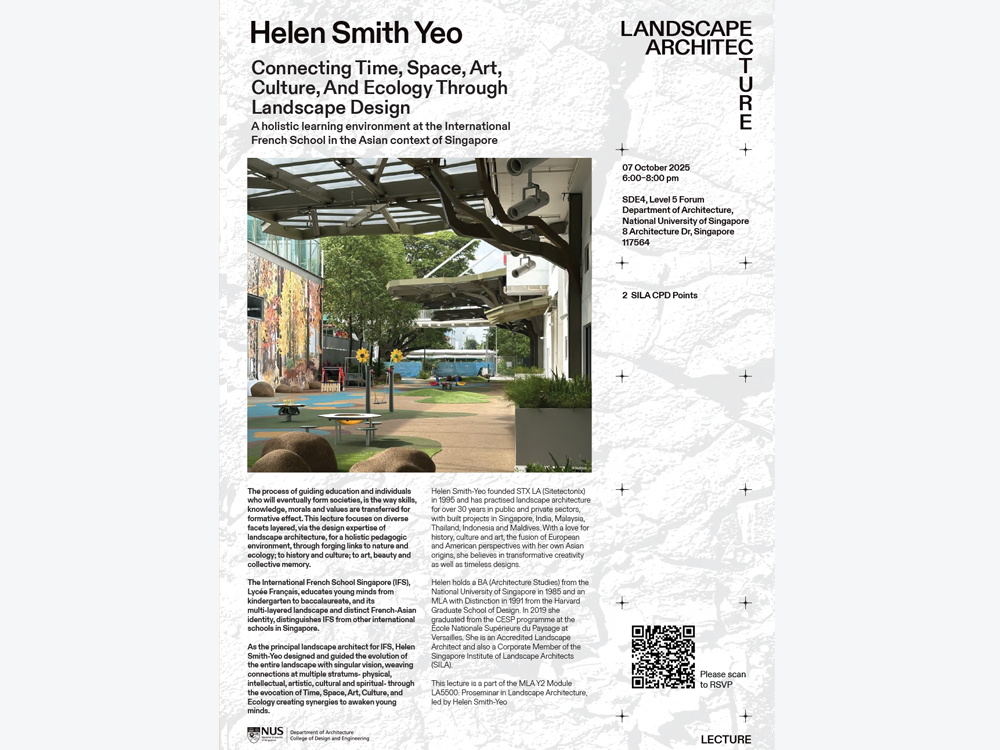
Guest Lecture by Helen Smith-Yeo – Connecting Time, Space, Art, Culture, And Ecology Through Landscape Design: A holistic learning environment at the International French School in the Asian context of Singapore
Date: 7th October 2025
Time: 6:00 pm – 8:00 pm
Venue: SDE4, Level 5 Forum, DOA, National University of Singapore, 8 Architecture Dr, Singapore 117564
The process of guiding education and individuals who will eventually form societies, is the way skills, knowledge, morals and values are transferred for formative effect. This lecture focuses on diverse facets layered, via the design expertise of landscape architecture, for a holistic pedagogic environment, through forging links to nature and ecology; to history and culture; to art, beauty and collective memory.
Helen Smith-Yeo founded STX LA (Sitetectonix) in 1995 and has practised landscape architecture for over 30 years in public and private sectors, with built projects in Singapore, India, Malaysia, Thailand, Indonesia and Maldives. With a love for history, culture and art, the fusion of European and American perspectives with her own Asian origins, she believes in transformative creativity as well as timeless designs.
This lecture is a part of the MLA Y2 Module LA5500: Proseminar in Landscape Architecture, led by Helen Smith-Yeo.
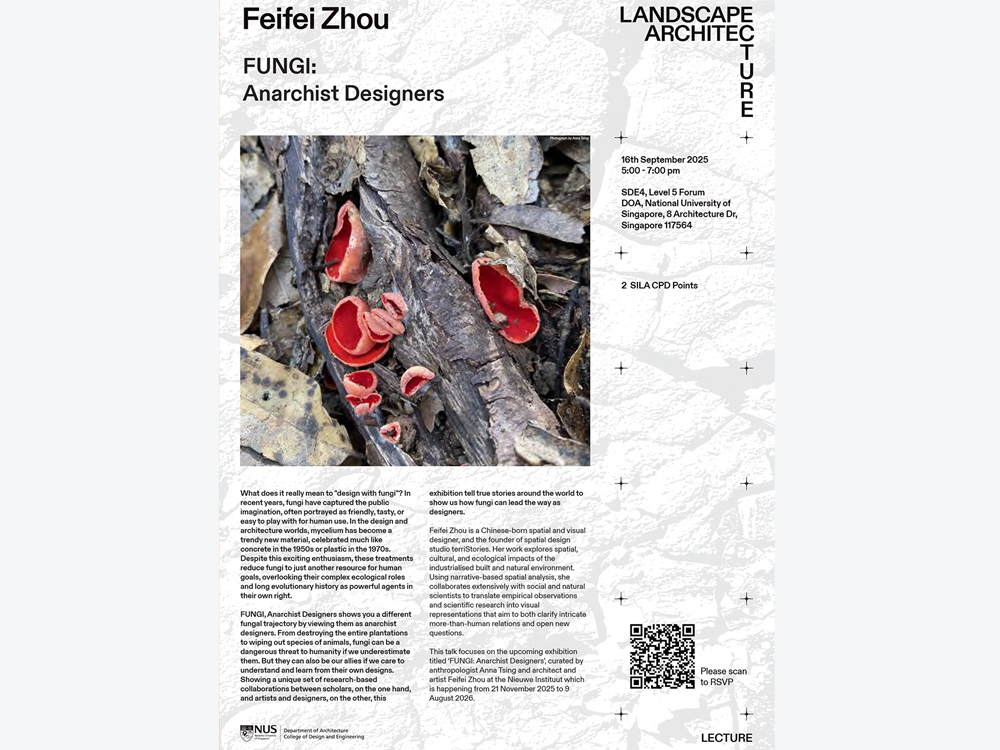
Guest Lecture by Feifei Zhou – FUNGI: Anarchist Designers
Date: 16th September 2025
Time: 5:00 pm – 7:00 pm
Venue: SDE4, Level 5 Forum, DOA, National University of Singapore, 8 Architecture Dr, Singapore 117564
FUNGI, Anarchist Designers shows you a different fungal trajectory by viewing them as anarchist designers. From destroying the entire plantations to wiping out species of animals, fungi can be a dangerous threat to humanity if we underestimate them. But they can also be our allies if we care to understand and learn from their own designs. Showing a unique set of research-based collaborations between scholars, on the one hand, and artists and designers, on the other, this exhibition tell true stories around the world to show us how fungi can lead the way as designers.
This talk focuses on the upcoming exhibition titled ‘FUNGI: Anarchist Designers’, curated by anthropologist Anna Tsing and architect and artist Feifei Zhou at the Nieuwe Instituut which is happening from 21 November 2025 to 9 August 2026.

UTokyo X NUS Memu Workshop
Obihiro, Hokkaido
26 July- 4 Aug 2025
In the summer of 2025, students from DOA, alongside Minor of Cities’ students, participated in the Memu Workshop at the Memu Open Research Campus (https://memu-orc.com/) in Obihiro, Hokkaido, Japan. The theme of the workshop was entitled Re-reading Human and Nature Connections; Re-thinking Sustainable Urban-Rural Relation. It was led by Dr. Yu Morishita and co-taught by Dr. Toru Terada and Dr. Giles Sioen (The University of Tokyo), Dr. Rosita Samsudin (NUS Cities), and Dr. Victoria Jane Marshall (DOA). This was the third run of the collaboration between NUS and UTokyo. Over the 10-day workshop, the students explored Obihiro through curated and self-directed fieldwork, as well as creative design research. All the student teams were interdisciplinary. Six UTokyo students from the Graduate School of Agricultural and Life Sciences and the Graduate School of Frontier Sciences joined seven NUS students from the Division of Industrial Design and Built Environment (with a Minor in Cities), DOA Master of Landscape Architecture and Architecture.
More information here.

Guest Lecture by Zarina Muhammad – Calling the Earth to Witness: Lessons on Artistic Ecologies, Threshold Crossing, Archival Fragments, Restless Topographies, and Learning Strangeness alongside Non-Human Collaborators
Date: 29th August 2025
Time: 6:00-8:00 pm
Venue: SDE4, Level 5 Forum, DOA, National University of Singapore, 8 Architecture Dr, Singapore 117564
This talk draws from Breathing in a World of Water // Calling the Earth to Witness, an ongoing transdisciplinary project that traces environmental histories, threshold crossings, and multispecies entanglements across archipelagic Southeast Asia. Grounded in site-sensitive artistic research and collaborative fieldwork, the project engages with urban shorelines, intertidal zones, submerged ruins, and coastal ecologies as living archives of ancestral knowledge, ecological memory, and political contestation.
This lecture, moderated by Wai Hon Tham, is a part of BLA4/MLA1 Studio LAD4001/ LA4701 “Fifth Nature”, led by Dr. Victoria Jane Marshall.

MLA Pizza Party
On Aug 11, 2025, the students of the Master of Landscape Architecture program enjoyed a pizza party to celebrate the start of the new semester. Organised by the landscape architecture faculty, the informal get-together gave the first-year students the opportunity to get to know their second-year peers. The SDE4 rain garden was animated by this lively student event supplemented by pizzas, doughnuts, and drinks.
A notebook welcome gift, designed by SWELL (https://swell.sg) and published by OFFCUT using paper materials salvaged materials from Singapore, was distributed to the students.
A special thank you to Assistant Professor, Janice Tung for coordinating this event!
A special thank you to MLA Program Director, Victoria Jane Marshall for coordinating the notebook welcome gift!




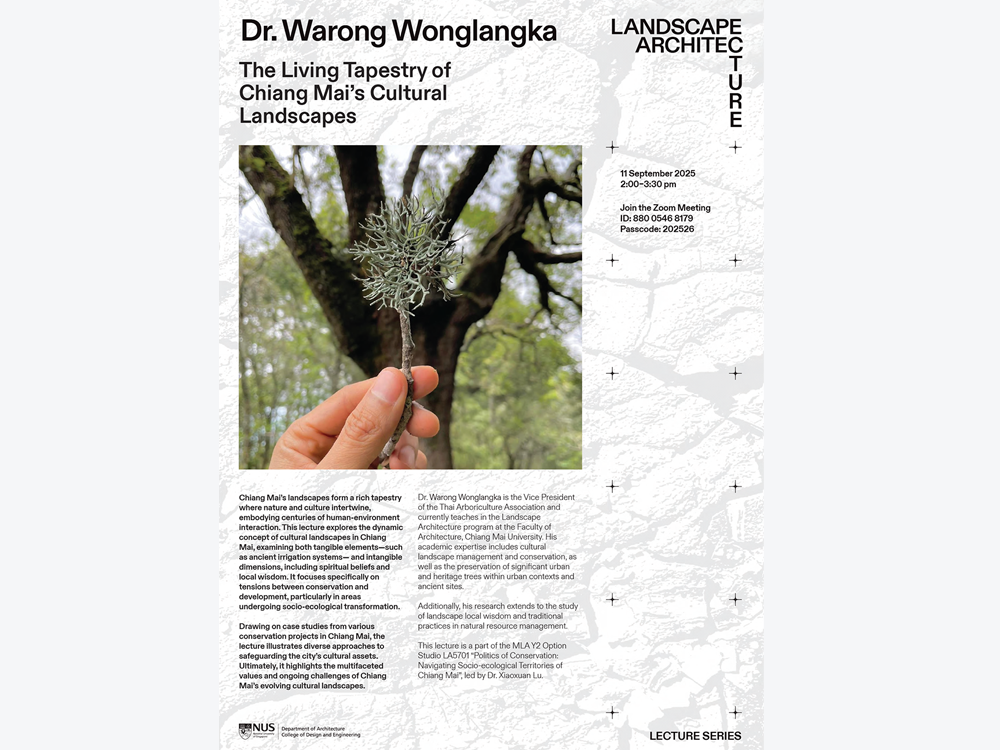
Guest Lecture by Dr. Warong Wonglangka: The Living Tapestry of Chiang Mai’s Cultural Landscapes
Thursday, 11 September 2025
2:00- 3:30 pm
Join the Zoom Meeting
ID: 880 0546 8179
Passcode: 202526
Chiang Mai’s landscapes form a rich tapestry where nature and culture intertwine, embodying centuries of human-environment interaction. This lecture explores the dynamic concept of cultural landscapes in Chiang Mai, examining both tangible elements—such as ancient irrigation systems— and intangible dimensions, including spiritual beliefs and local wisdom. It focuses specifically on tensions between conservation and development, particularly in areas undergoing socio-ecological transformation.
Drawing on case studies from various conservation projects in Chiang Mai, the lecture illustrates diverse approaches to safeguarding the city’s cultural assets. Ultimately, it highlights the multifaceted values and ongoing challenges of Chiang Mai’s evolving cultural landscapes.
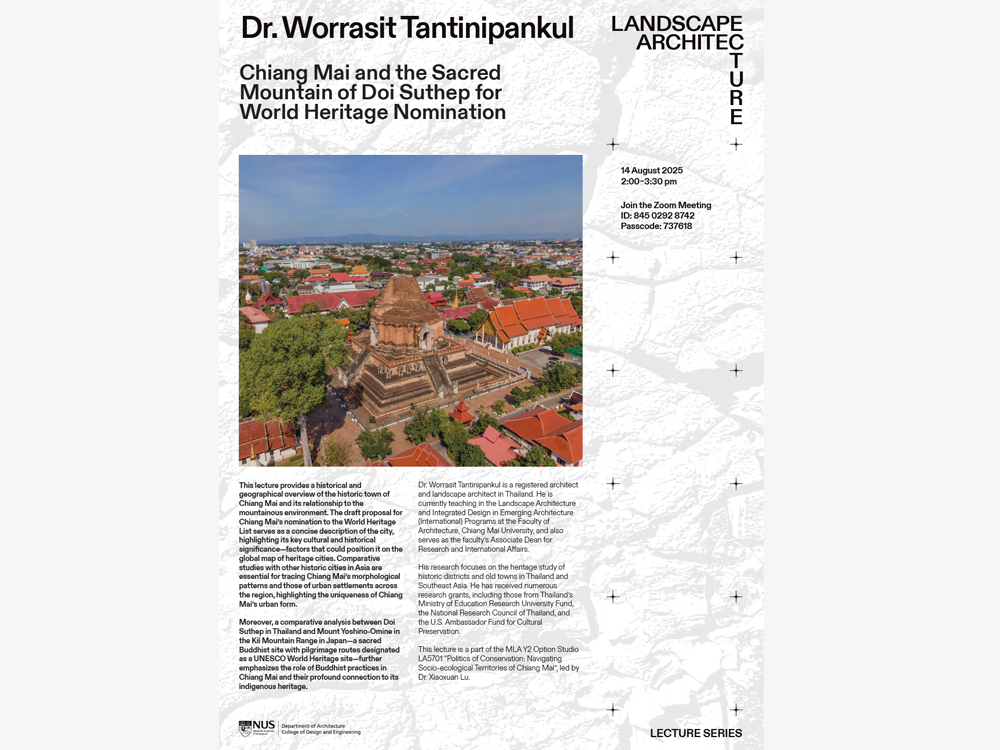
Guest lecture by Dr. Worrasit Tantinipankul: Chiang Mai and the Sacred Mountain of Doi Suthep for World Heritage Nomination
Thursday, 14 August 2025
2:00- 3:30 pm
Join the Zoom Meeting
ID: 845 0292 8742
Passcode: 737618
This lecture provides a historical and geographical overview of the historic town of Chiang Mai and its relationship to the mountainous environment. The draft proposal for Chiang Mai’s nomination to the World Heritage List serves as a concise description of the city, highlighting its key cultural and historical significance—factors that could position it on the global map of heritage cities. Comparative studies with other historic cities in Asia are essential for tracing Chiang Mai’s morphological patterns and those of urban settlements across the region, highlighting the uniqueness of Chiang Mai’s urban form.
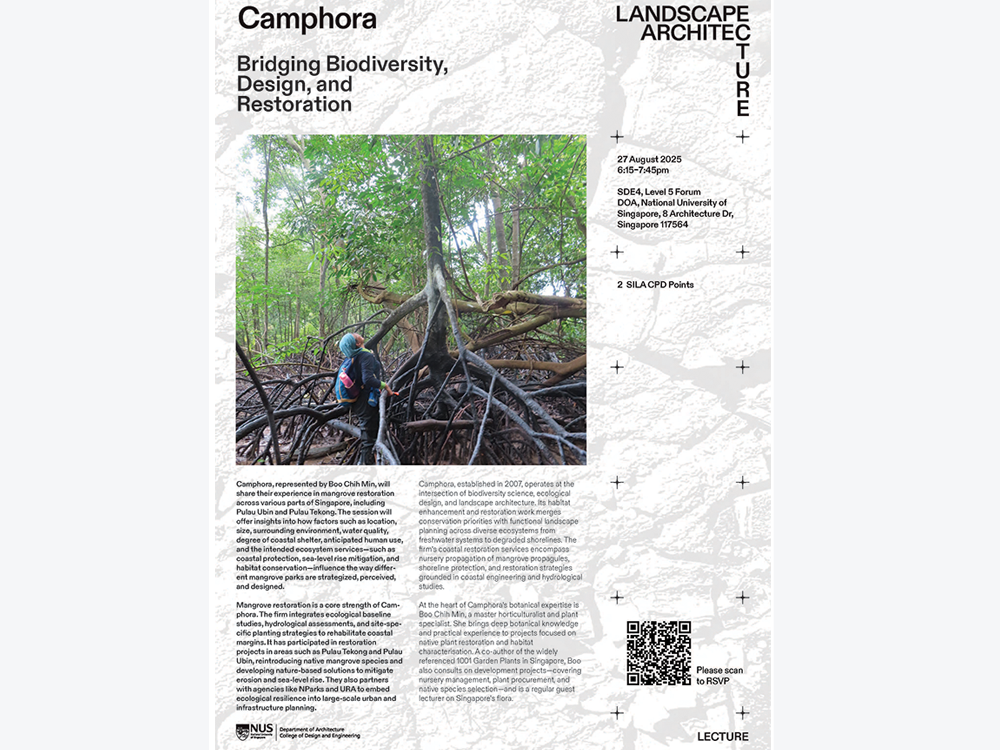
Guest lecture by Camphora: Bridging Biodiversity, Design, and Restoration Technology
Camphora, led by Boo Chih Min, specializes in mangrove restoration across Singapore, including Pulau Ubin and Pulau Tekong. Their approach considers factors like location, environment, water quality, and intended ecosystem services—such as coastal protection and habitat conservation—in designing mangrove parks. Established in 2007, Camphora blends biodiversity science, ecological design, and landscape architecture, offering services like mangrove propagation, shoreline protection, and restoration based on coastal engineering and hydrology.
Date: Wednesday, 27 August 2025
Time: 18:15 – 19:45
Venue: SDE4, Level 5, Forum
2 SILA CPD Points
Please register your interest here.
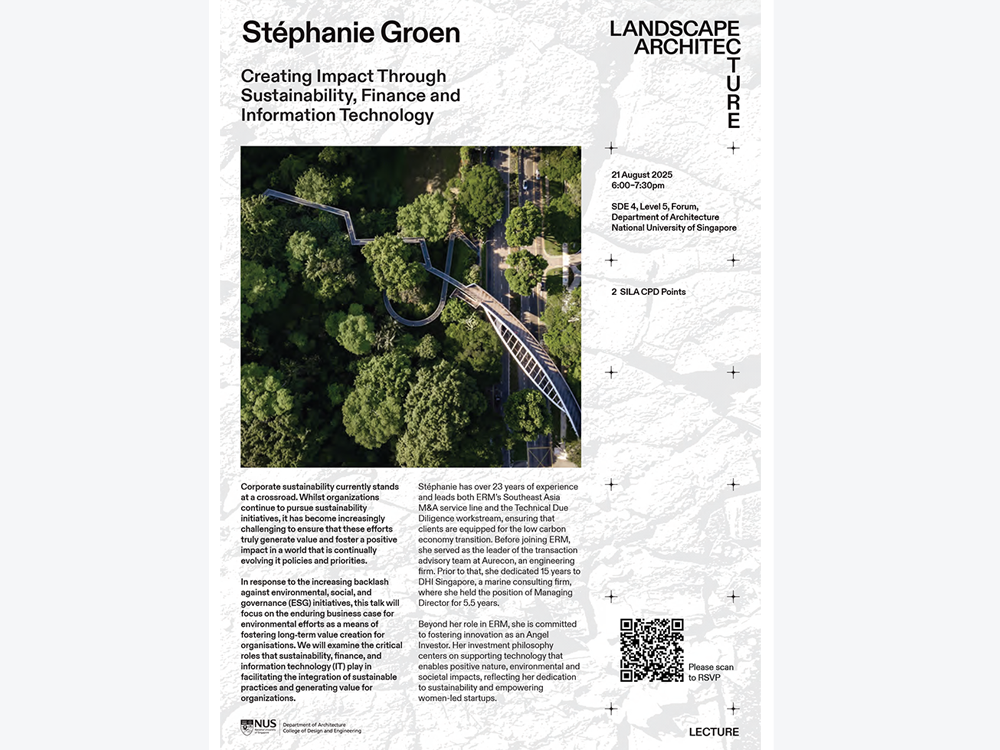
Guest lecture by Stéphanie Groen: Creating Impact Through Sustainability, Finance and Information Technology
Corporate sustainability currently stands at a crossroad. Whilst organizations continue to pursue sustainability initiatives, it has become increasingly challenging to ensure that these efforts truly generate value and foster a positive impact in a world that is continually evolving it policies and priorities.
In response to the increasing backlash against environmental, social, and governance (ESG) initiatives, this talk will focus on the enduring business case for environmental efforts as a means of fostering long-term value creation for organisations. We will examine the critical roles that sustainability, finance, and information technology (IT) play in facilitating the integration of sustainable practices and generating value for organizations.
Date: Thursday, 21 August 2025
Time: 18:00—19:30
Venue: SDE4, Level 5, Forum
2 SILA CPD Points
RSVP here.

M.Arch alumna Tang Wei (Class of 2024) has been honored with an invitation to exhibit her thesis project at the prestigious ‘10X10|A Hundred Visions Beyond 10 Perspectives’ international showcase in Kaohsiung, Taiwan. Her work, exploring the effects of ecotourism on periurban Lombok communities and supervised by Dr. Victoria Marshall, was selected by a prominent jury after its previous feature at the International Exhibition of Architecture Graduation Design in Taipei. The exhibition, part of Taiwan’s Youth Design Festival, runs from 1 May to 7 September 2025 at The Pier-2 Art Center, Warehouse C5, showcasing top emerging designers and fostering creative dialogue.
Learn more: https://en.pier2.org/exhibition/info/1582/
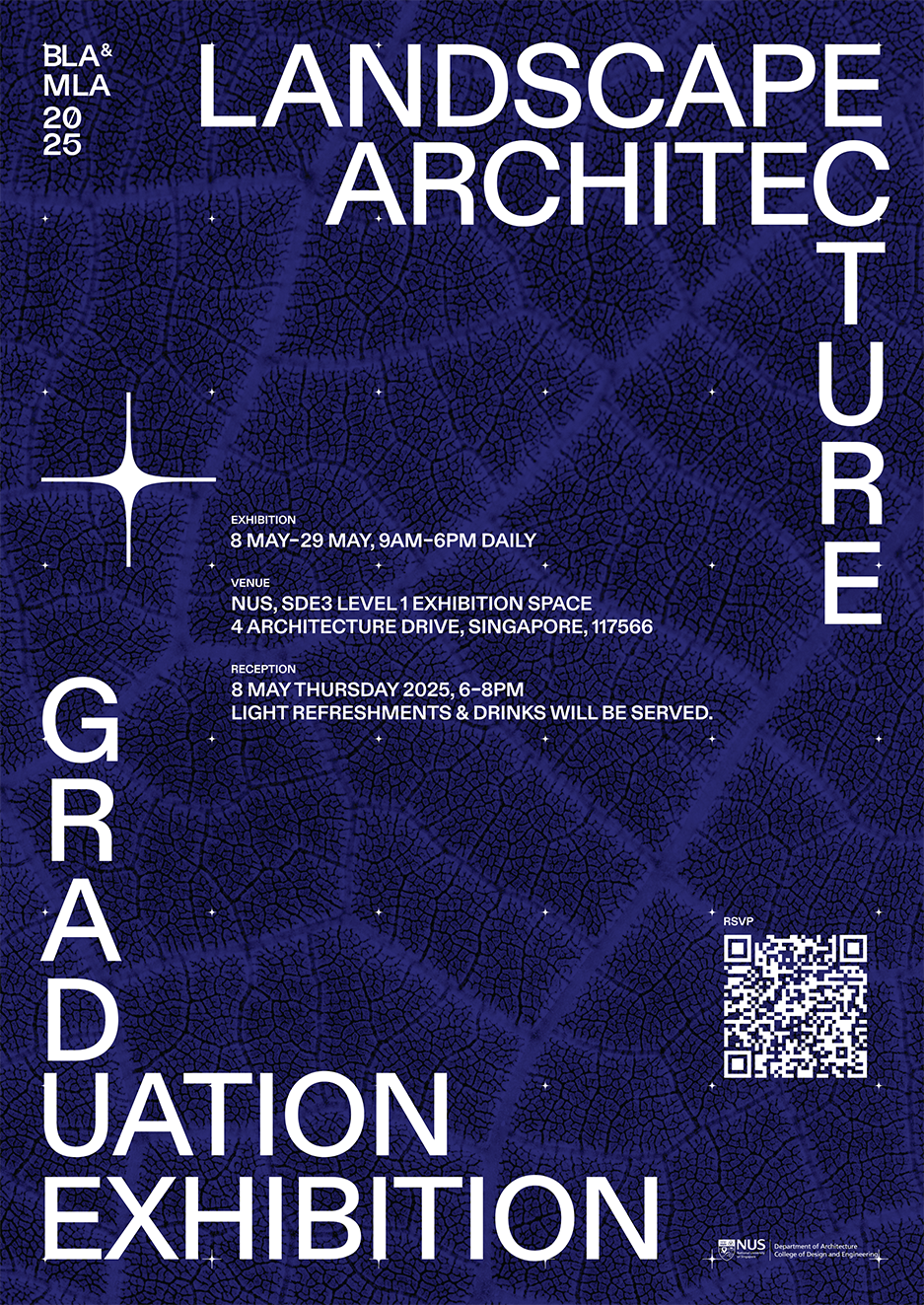
We are pleased to invite you to this year’s Bachelor of Landscape Architecture (BLA) and Master of Landscape Architecture (MLA) Graduation Exhibition.
We are excited to announce a joint opening night in collaboration with the Urban Design (MAUD) and Urban Planning (MUP) programmes. This event presents a unique opportunity to explore the diverse ideas emerging from our graduating class across these three interconnected fields within the department.
Grad Show Exhibition
Date: 8th – 29th May 2025
Time: 9am – 6pm
Venue: SDE 3, Level 1 Exhibition Space, 4 Architecture Drive, Singapore 117566
Direction: https://maps.app.goo.gl/fg2G4uVUZMkCfZYo8
Opening Reception
Date: 8th May 2025
Time: 6pm – 8pm
Venue: SDE 3, Level 1 Foyer, Singapore 117566
Light refreshments and drinks will be served.
Please RSVP here by 1st May 2025.
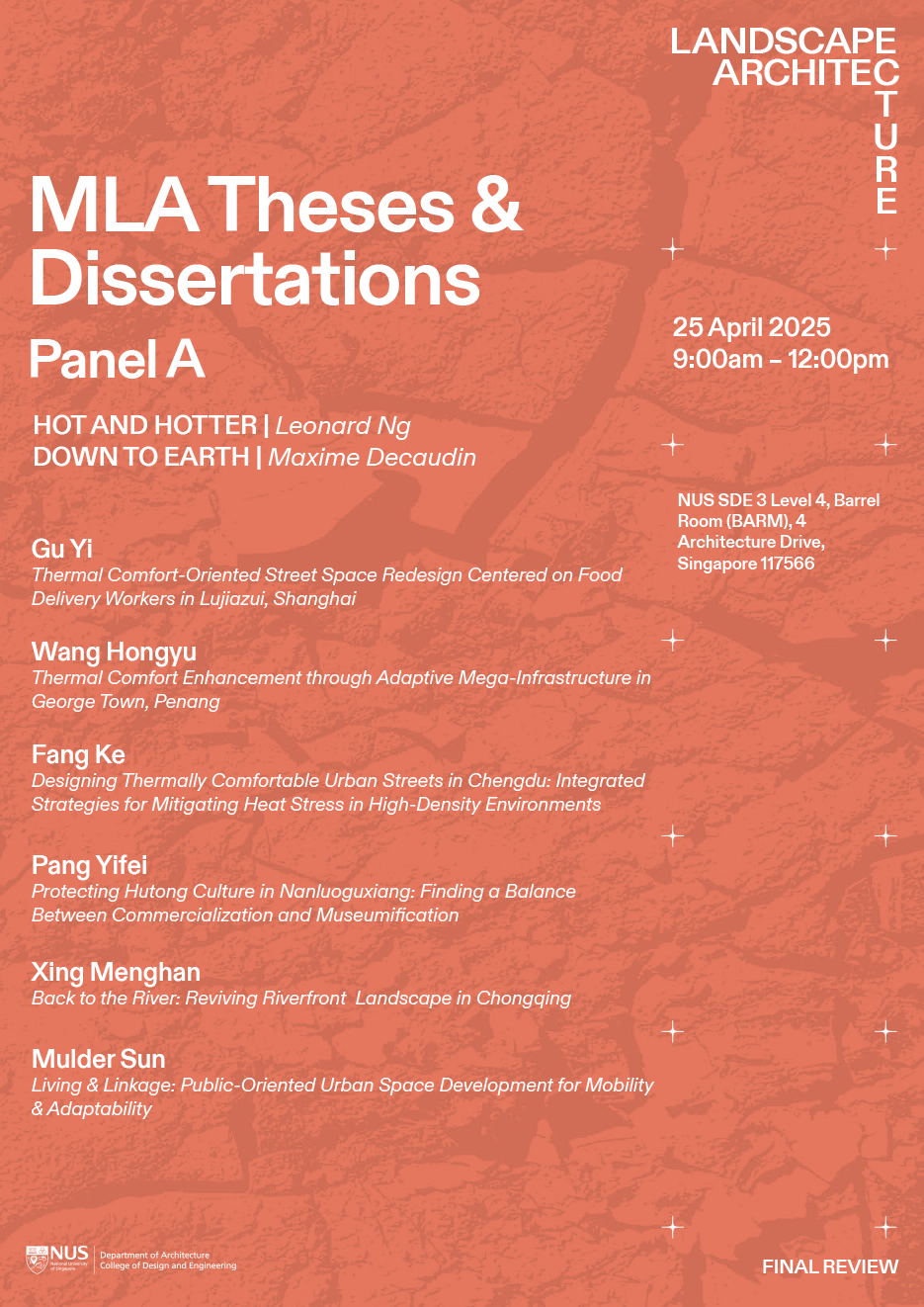
We are pleased to invite you to the Master of Landscape Architecture Theses & Dissertations Review for Semester 2, taking place this Friday, 25 April 2025, at the SDE3 Barrel Room, Level 4.
Join us to explore the design research projects by our master’s students. The panel thematics are as follows:
9am – 12pm
Panel A:
1. Hot and Hotter
2. Down to Earth
Panel B:
1. Post Human
2. Landscape Silhouette
2pm – 5:30pm
Panel C:
1. Machined Landscapes
2. By The Water’s Edge
Panel D:
1. Ecology For Urbanizing Islands
2. Soil Agency
3. Value Articulation in Landscape Architecture
Everyone is welcome to attend!
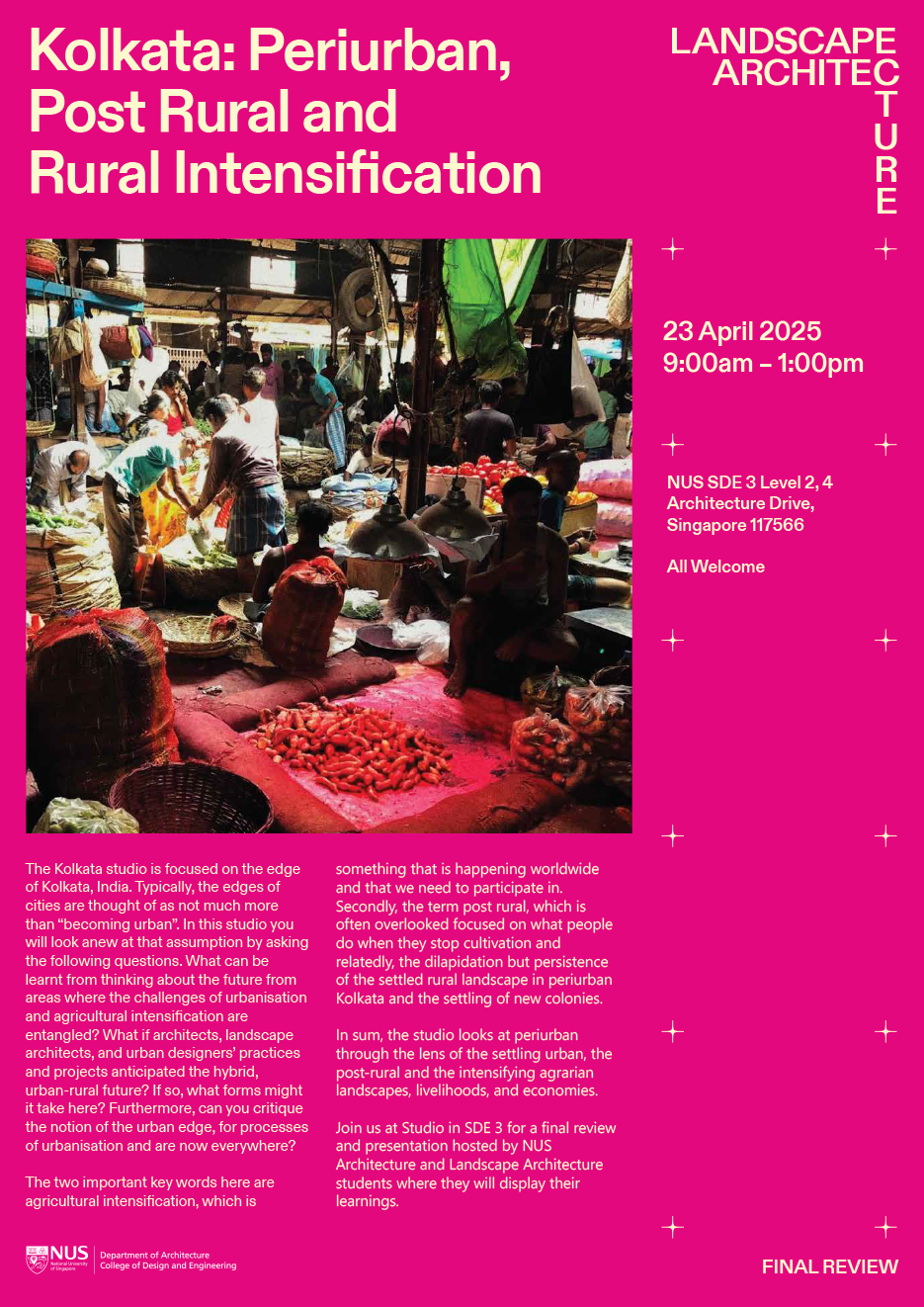
This semester, BLA4 and MLA1 students could choose from a diverse range of option studios—spanning Singapore (Pearls’ Hill, Singapore Islands) and regional sites (Hong Kong, Kolkata, Suzhou, Tokyo)—with both disciplinary and interdisciplinary options available.
Join us for their Final Reviews:
23 April 2025, SDE3 Level 2, 9am–1pm:
Kolkata: Periurban, Post Rural and Rural Intensification
Re-envisioning the China-Singapore Suzhou Industrial Park
24 April 2025:
SDE3 Barrel Room, Level 4, 9am–12:30pm:
The Singapore Islands: Redefining Southern and Western Island
Post Mega Games: Tokyo Studio
SDE3 Digital Design Lab 1 & 2, Level 3, 9am–4pm:
Rebooting Pearl’s Hill: Computational and AI Driven Studio
SDE1 Exhibition Hall, Level 1, 9am–6pm:
Patterns and Functions in Landscapes: Prototyping Neighbourhood Landscapes in a Densifying Hong Kong
All are welcome—come be inspired!
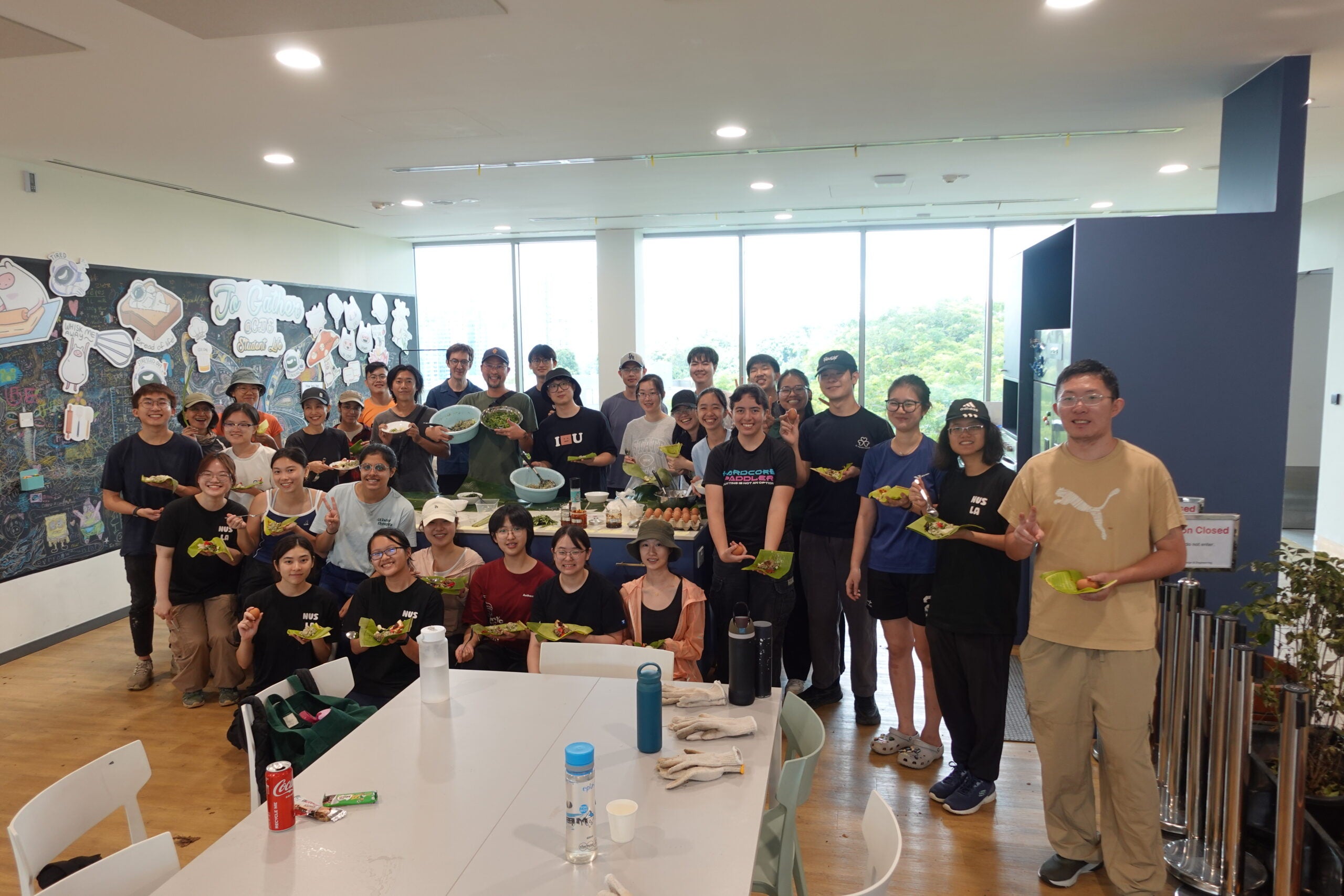
On 24 February 2025, the Landscape Architecture Collective (LAC) held its 7th Planting Day at the Nasi Ulam Forest Garden near CELC.
Supported by UCI, 25 students and staff, mainly from CDE, joined to promote sustainable campus greening. Activities included harvesting and propagating edible plants, composting, and a ‘Farm to Table’ cooking session with garden ingredients. Participants learned foraging, propagation, and cooking techniques, enjoying dishes like Nasi Ulam. The event was praised for its hands-on impact and community spirit, with students and faculty eager for future initiatives.
(Contributed by Toh Wen Ting, Goh Yi Wei, Zenn Lim, Tee Wan Ching, Cleon Lai Yi Hu, and Sumaiya Azad.)
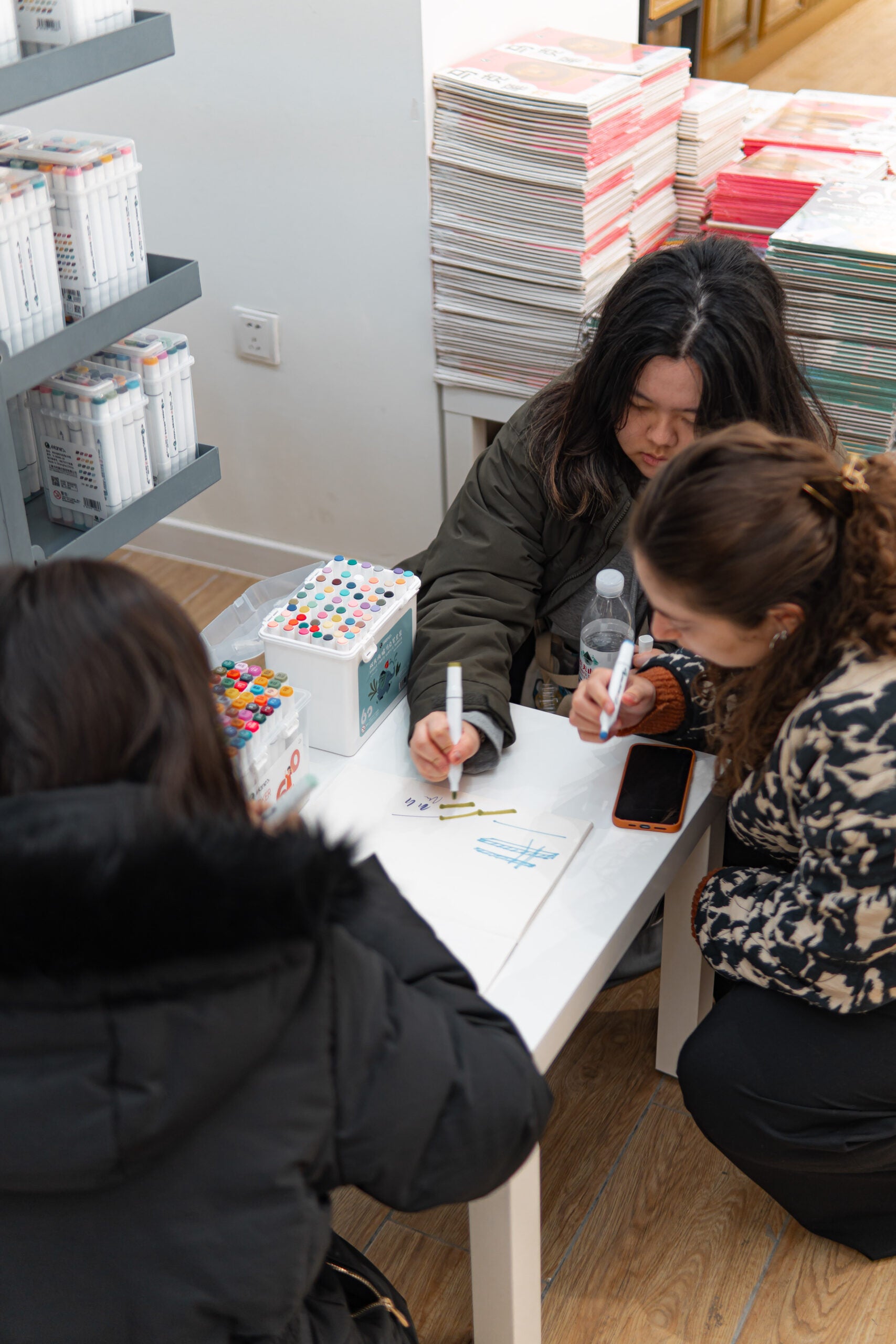
From 24 February to 1 March 2025, the Suzhou option studio, led by Koon Wee and Jason Ang Kwang Lin, visited Shanghai and Suzhou for a week-long fieldwork trip. Students explored Shanghai’s arts districts, visited industrial companies, and attended a workshop at Xi’an Jiaotong Liverpool University. They toured the Marie Art Supply factory and Neri&Hu Design & Research Office, gaining insights from local professionals. A guided visit to Ascendas Xinsu Business Park highlighted the influence of Singaporean planning in Suzhou Industrial Park. The fieldwork deepened students’ understanding of the unique collaboration between Suzhou and Singapore.
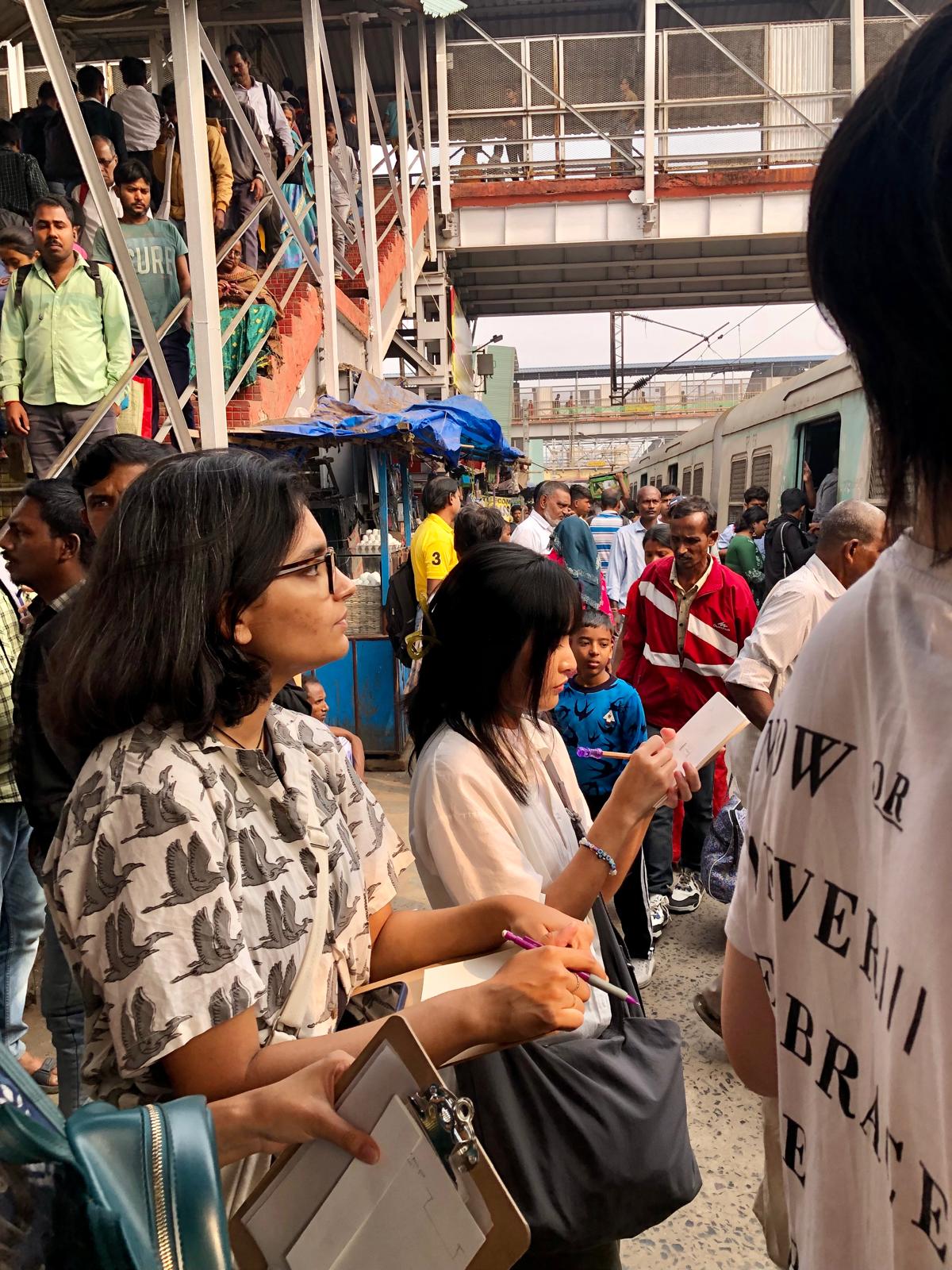
From 23 February to 2 March 2025, the Kolkata option studio, led by Victoria Jane Marshall, conducted fieldwork along the Sealdah–Canning railway line in periurban Kolkata. Focusing on four key stations—Bidyadharpur, Kalikapur, Champahati, and Piali—students explored local markets, traveled with vendors, and documented social and ecological dynamics. Guided research included interactions at Ballygunge Junction and Koley Market, tracing produce from farm to city. The trip concluded with visits to cultural landmarks in Kolkata’s diverse “grey town,” enriching students’ understanding of the region’s heritage and urban life. This fieldwork bridged academic research with real-world spatial and social insights.
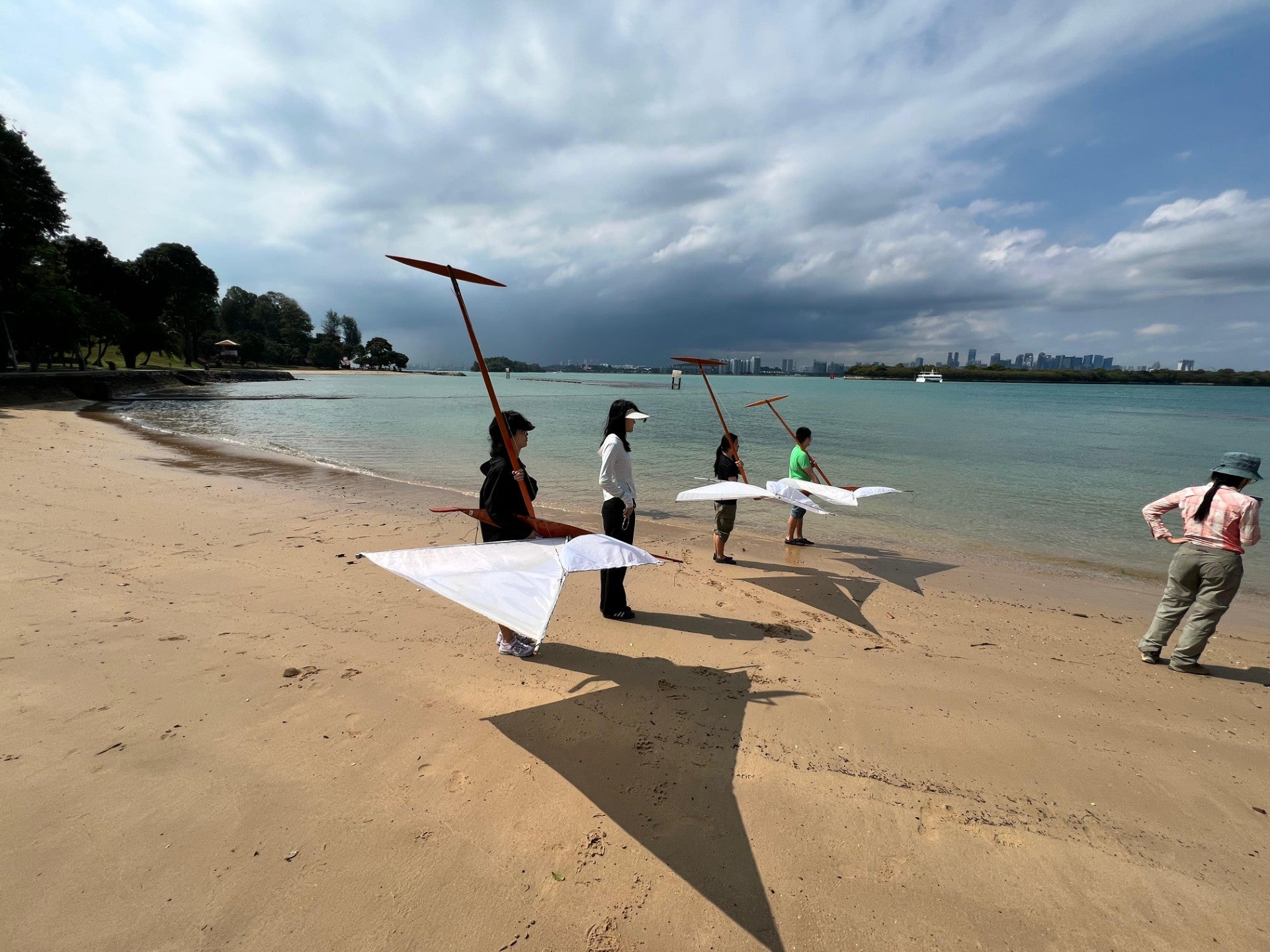
From 14–16 February 2025, the Singapore Islands option studio, led by Lyn Liu and Mel Yip, conducted fieldwork exploring Singapore’s western and southern islands—often overshadowed by the main island. Students toured with guides Lisa Lim and Richard Kuah, learning about the islands’ changing landscapes and histories, and heard from ex-islander Fawzi Nasir. They also built and raced traditional jong boats. The studio will share initial findings at Queenstown Community Library, with a final exhibition in early May.
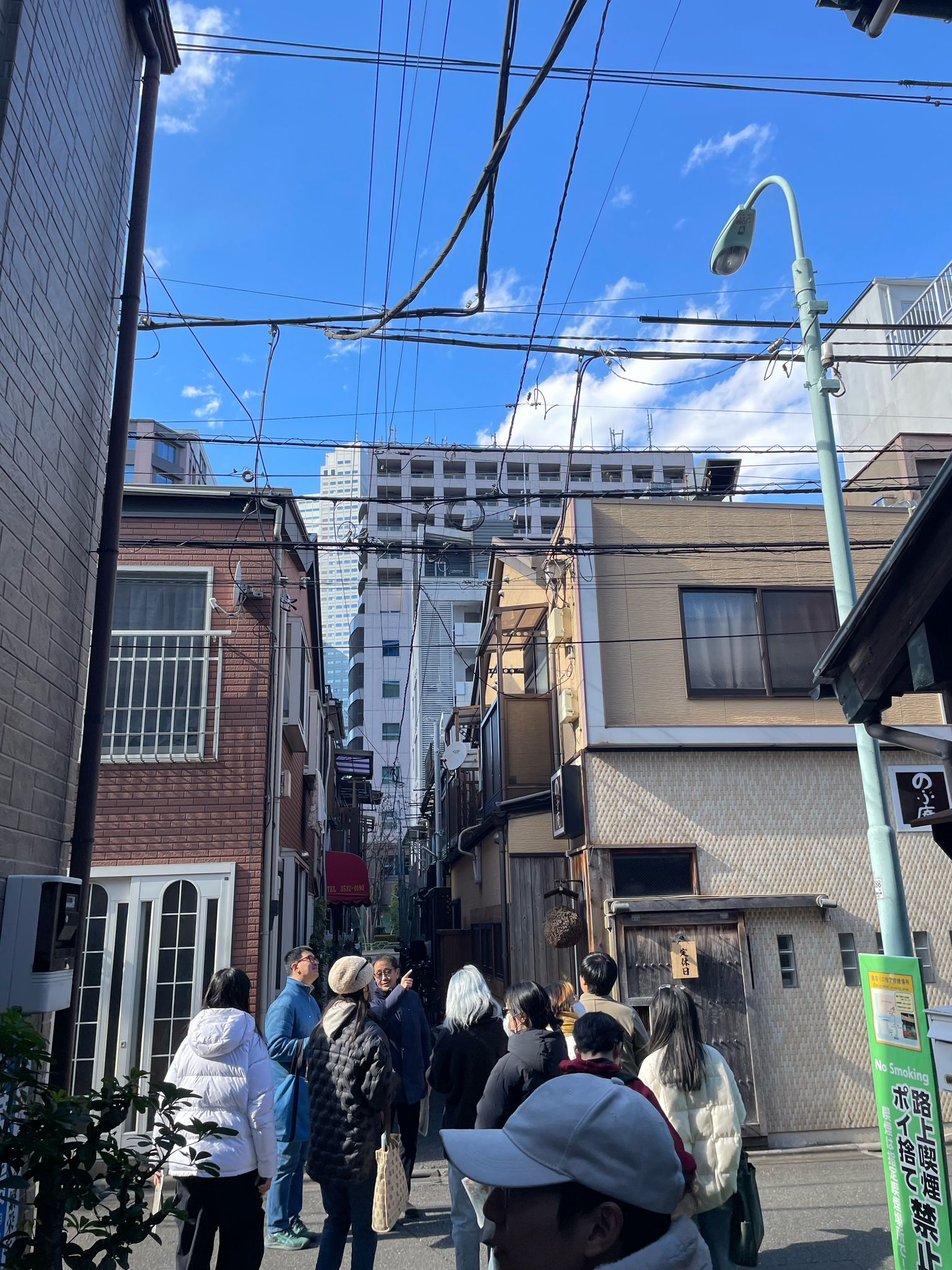
From 14–16 February 2025, the Post Mega Games option studio, led by Yifeng Lin, conducted fieldwork in Tokyo focusing on Harumi and Tsukishima Islands—two areas shaped by rapid urban change and the post-Olympic era. Harumi Island, transformed by the 2020 Olympics into a residential zone, raised questions about urban reuse and integration, while Tsukishima Island retained its local character despite development pressures. The studio analyzed how these sites balance large-scale development with community resilience, offering insights into Tokyo’s evolving urban strategies.
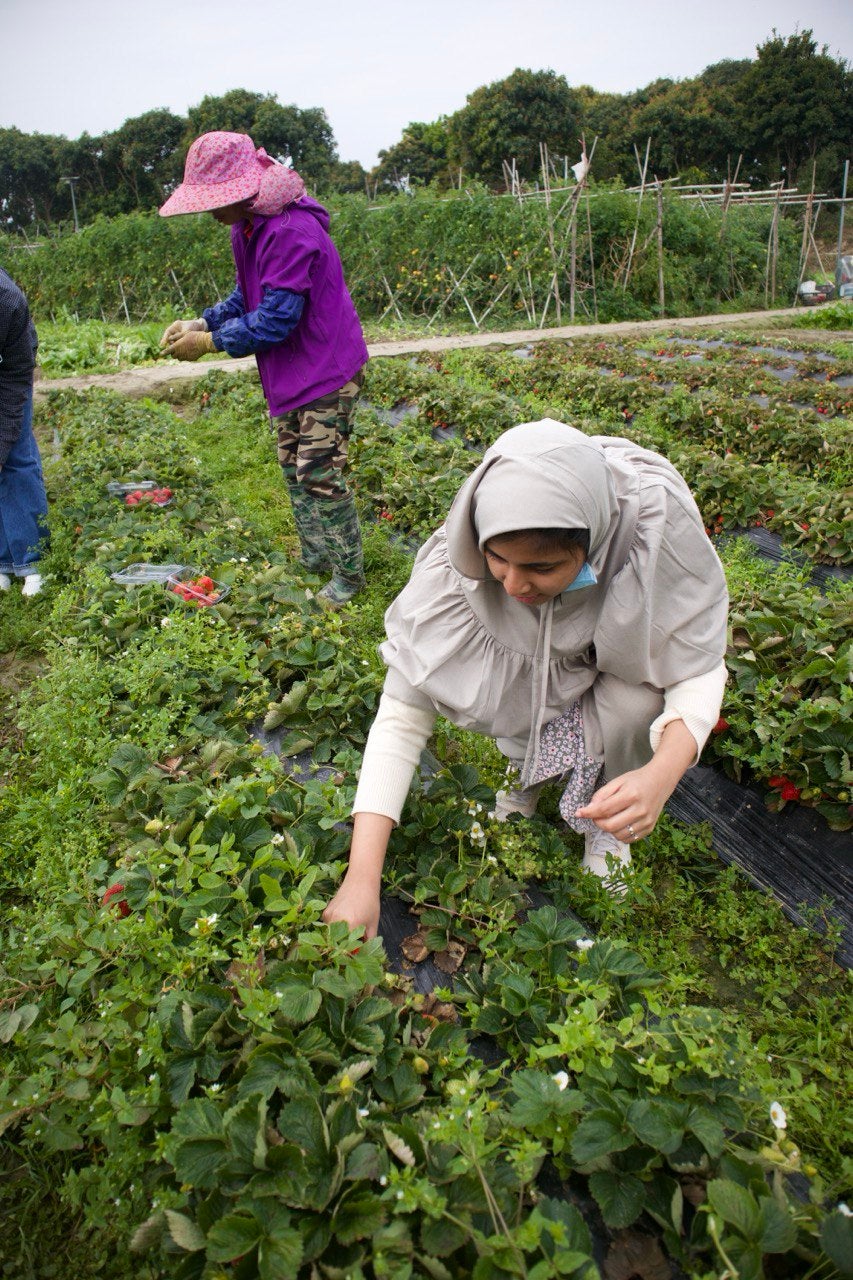
From 9–15 February 2025, the Patterns and Functions in Landscapes: Prototyping Neighbourhood Landscapes in a Densifying Hong Kong studio, led by Yun Hye Hwang and Puay Yok Tan, conducted fieldwork in Hong Kong. Focusing on greenfield areas near Shenzhen facing development pressure, students developed urban and landscape strategies to address environmental impacts, using pattern-based planning. The studio collaborated with Future Cities Lab, Tsinghua University, and HKU, and included reviewers from Liber Research Community, a local farmer, and a filmmaker. Students explored diverse landscapes and gathered insights through on-site research, interviews, and community engagement, culminating in PechaKucha presentations at HKU where they shared findings with local stakeholders and tutors.
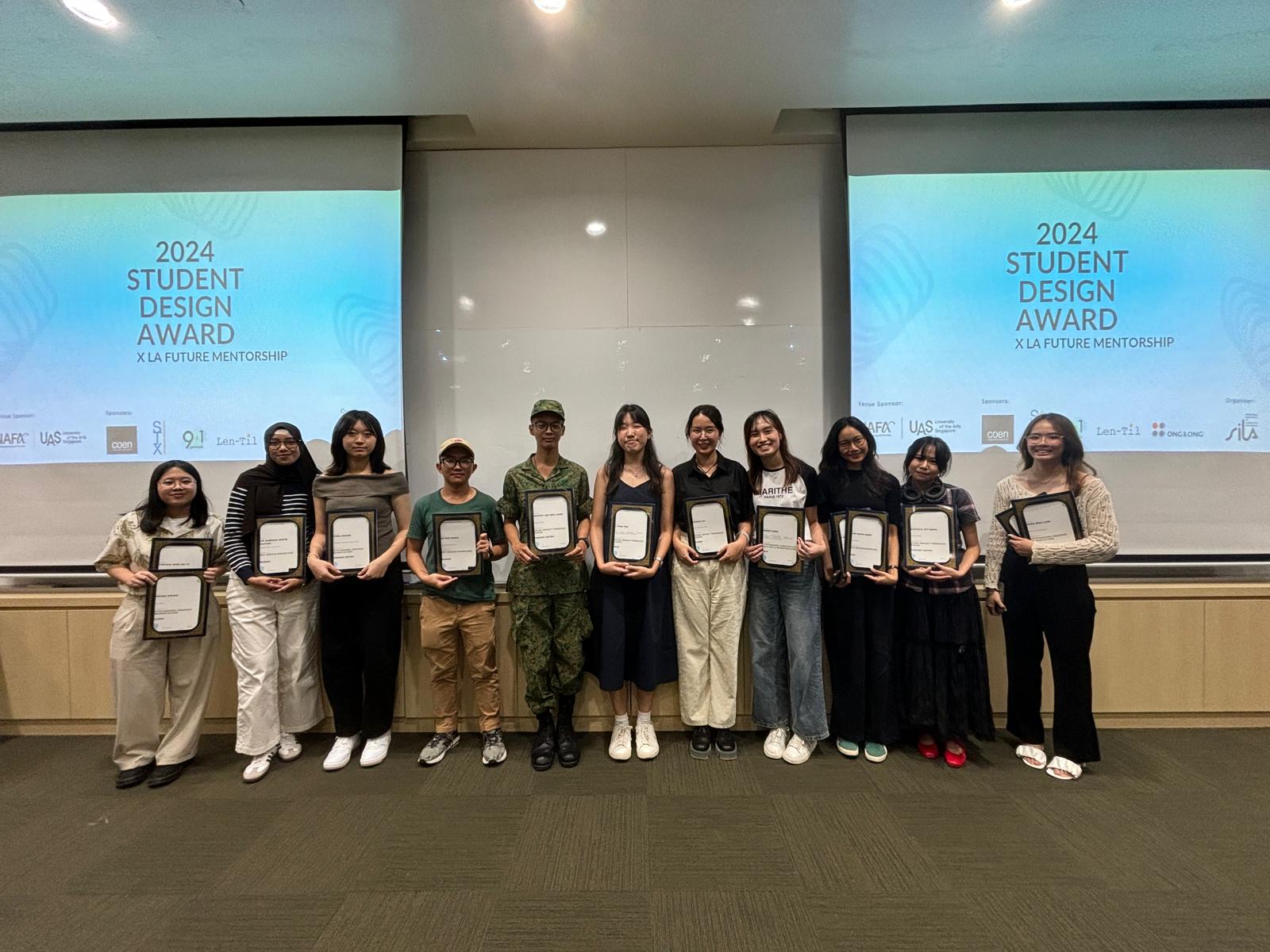
Nine undergraduate and master’s students from the Landscape Architecture programme have recently triumphed in the Singapore Institute of Landscape Architects (SILA) Student Design Awards 2024 – Beyond Just Green, under the University Category.
The theme “Beyond Just Green” epitomises the intellectual rigour of the profession, inspiring creative design solutions within parameters determined by research and analysis. It aims to raise awareness that landscape architecture extends beyond the ‘green’ norms of designing with plants and gardens.
Both programme directors, Dr Terrence Tan (BLA) and Dr Victoria Marshall (MLA), enthusiastically congratulated the winners: “Congratulations on your outstanding achievement in the SILA Student Design Awards 2024! Your creativity and passion have truly shone through, setting a high standard for excellence. We are proud of your innovative designs and hope that your success will inspire our BLA and MLA students to reach even greater heights.”
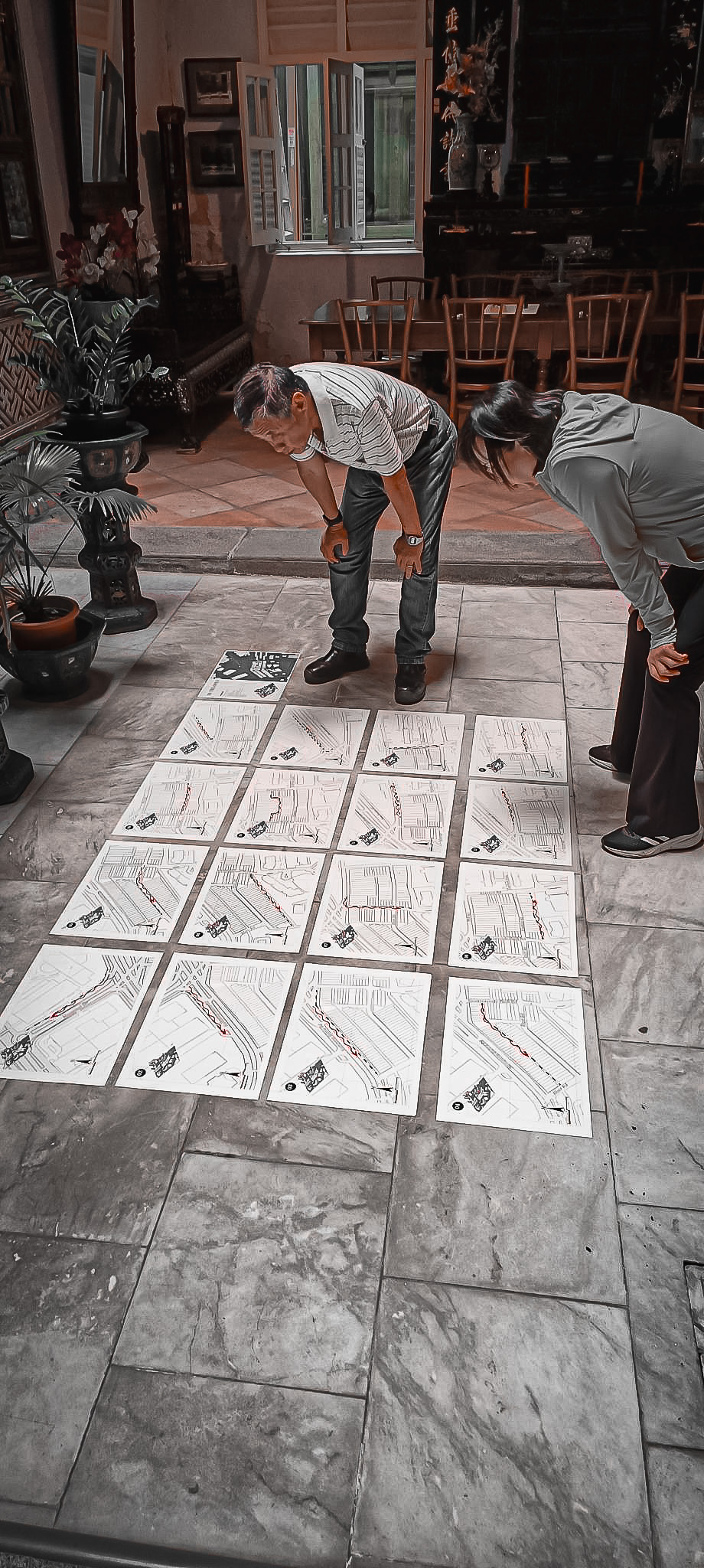
The NUS Baba House was pleased to host Dr. Victoria Jane Marshall, Senior Lecturer and Director of the Master of Landscape Architecture programme at NUS, for a sensory mapping workshop with our docents. Ten participants—adult and student docents—explored Blair Plain by recording and mapping sounds, moving beyond visual observation to discover the neighbourhood’s hidden diversity through listening.
This creative approach encouraged docents to develop a richer, more critical understanding of the area, which will inform their future tours. The workshop highlights Baba House’s commitment to innovative learning and collaboration with NUS departments. We look forward to more such activities and thank Dr. Marshall and her assistants for their support.
(Contributed by Summer Chiuh, NUS Baba House)
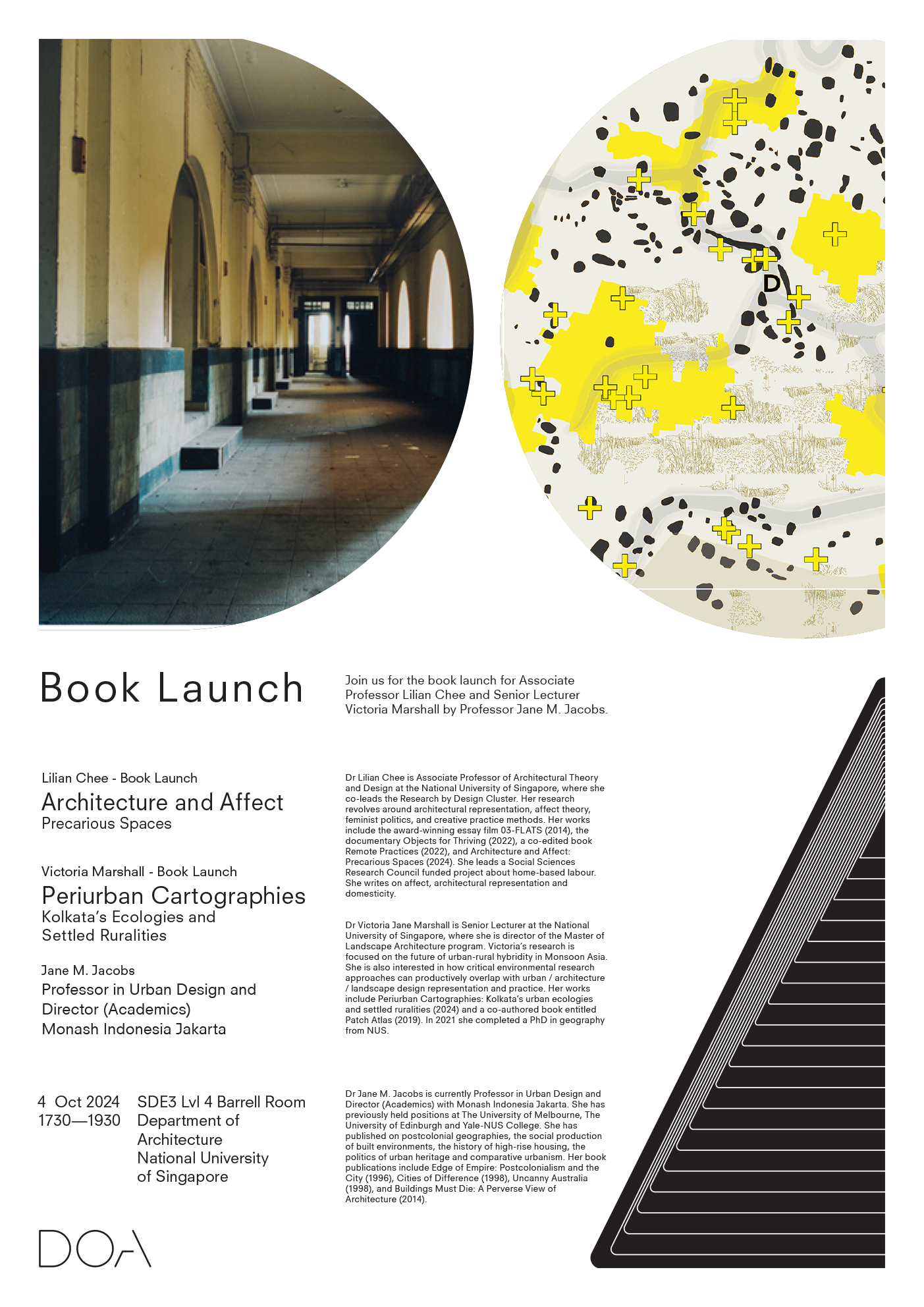
Join us for the book launch of Associate Professor Lilian Chee’s Architecture and Affect and Senior Lecturer Victoria Marshall’s Periurban Cartographies, hosted by Professor Jane M. Jacobs.
Date: Friday, 4 Oct 2024
Time: 5:30 PM – 7:30 PM
Venue: SDE3 Level 4 Barrel Room
-
Architecture and Affect – Lilian Chee:
This book explores how lived emotions shape architecture, challenging traditional views by positioning architecture as deeply intertwined with life, objects, and events. Through examples from contemporary Singapore, it bridges critical and speculative thinking, advocating for a politicized architectural discourse that integrates both intuition and analysis. -
Periurban Cartographies – Victoria Marshall:
Focusing on Kolkata’s “almost urban” zones, this work rethinks urban theory by highlighting everyday life and political empowerment in periurban areas. It offers new insights into urban political ecology and challenges conventional notions of city and change, drawing from Asian perspectives.
About the Authors:
Lilian Chee (Associate Professor, NUS) researches affect, architectural representation, and creative intersections in architecture and visual cultures. Victoria Marshall (Senior Lecturer, NUS) studies urban-rural hybridity and environmental research in Monsoon Asia.
Jane M. Jacobs (Professor, Monash Indonesia) is a leading scholar in urban design and postcolonial urbanism.
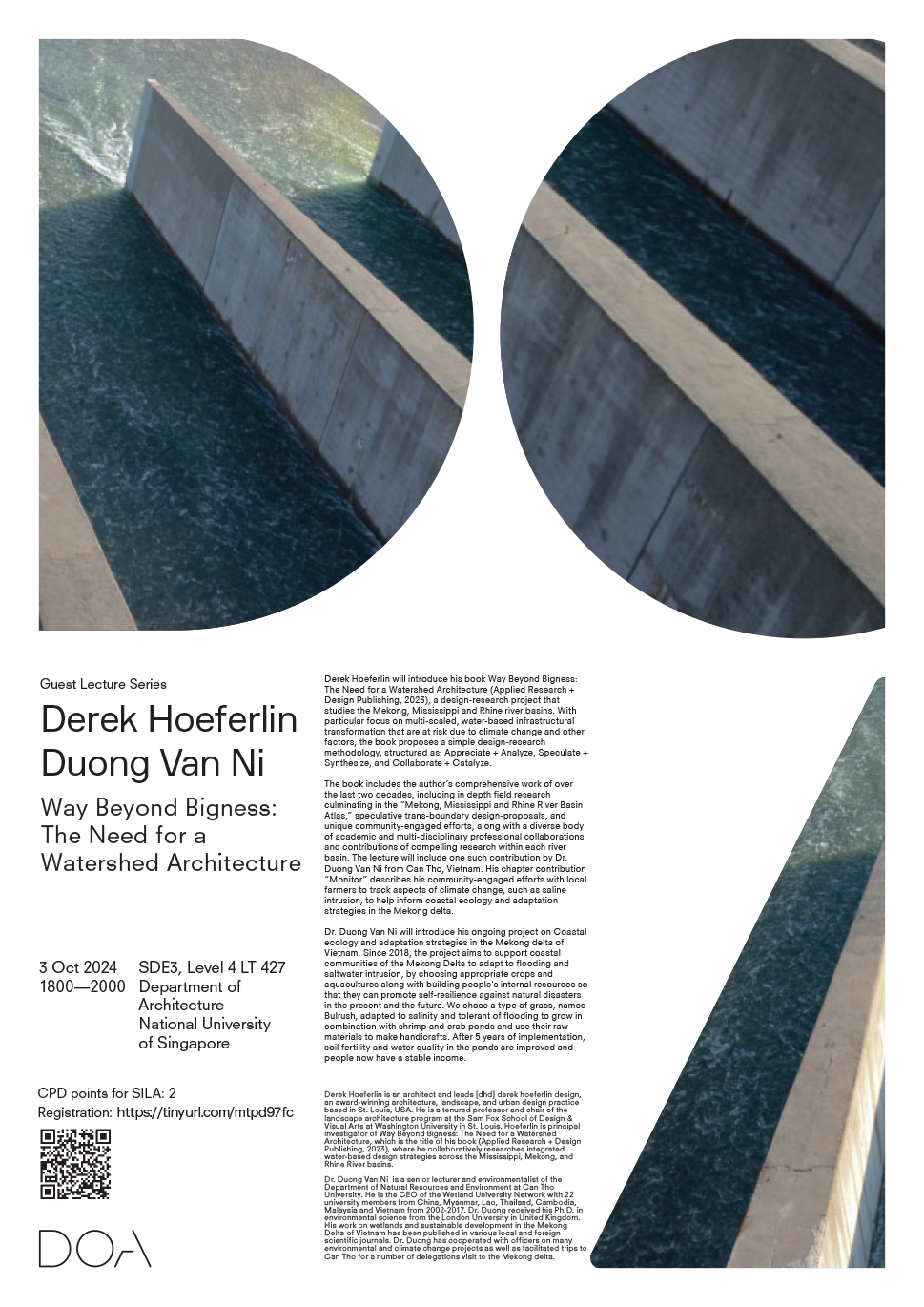
Guest Lecture
Way Beyond Bigness: The Need for a Watershed Architecture
Date: Thursday, 3 Oct 2024
Time: 6:00 PM – 8:00 PM
Venue: SDE3 Level 4 LT 427 – Design Forum
Derek Hoeferlin will introduce his book Way Beyond Bigness: The Need for a Watershed Architecture (Applied Research + Design Publishing, 2023), a design-research project that studies the Mekong, Mississippi and Rhine river basins. With particular focus on multi-scaled, water-based infrastructural transformation that are at risk due to climate change and other factors, the book proposes a simple design-research methodology, structured as: Appreciate + Analyze, Speculate + Synthesize, and Collaborate + Catalyze.
The book includes the author’s comprehensive work of over the last two decades, including in depth field research culminating in the “Mekong, Mississippi and Rhine River Basin Atlas,” speculative trans-boundary design-proposals, and unique community-engaged efforts, along with a diverse body of academic and multi-disciplinary professional collaborations and contributions of compelling research within each river basin. The lecture will include one such contribution by Dr. Duong Van Ni from Can Tho, Vietnam. His chapter contribution “Monitor” describes his community-engaged efforts with local farmers to track aspects of climate change, such as saline intrusion, to help inform coastal ecology and adaptation strategies in the Mekong delta.
Dr. Duong Van Ni will introduce his ongoing project on Coastal ecology and adaptation strategies in the Mekong delta of Vietnam. Since 2018, the project aims to support coastal communities of the Mekong Delta to adapt to flooding and saltwater intrusion, by choosing appropriate crops and aquacultures along with building people’s internal resources so that they can promote self-resilience against natural disasters in the present and the future. We chose a type of grass, named Bulrush, adapted to salinity and tolerant of flooding to grow in combination with shrimp and crab ponds and use their raw materials to make handicrafts. After 5 years of implementation, soil fertility and water quality in the ponds are improved and people now have a stable income.

Singapore Design Week
Date: 26 September to 6 October 2024
Venue: NUS SDE 3 Level 1 Exhibition Space, 4 Architecture Drive, Singapore 117566
Time: 10am – 5pm
Free entry
In conjunction with Singapore Design Week, an annual festival celebrating creativity and innovation, NUS Landscape Architecture will be showcasing their student works in line with this year’s theme: People of Design, shedding light on the everyday visionaries that shape our society through design.
Organised by: Landscape Architecture Collective
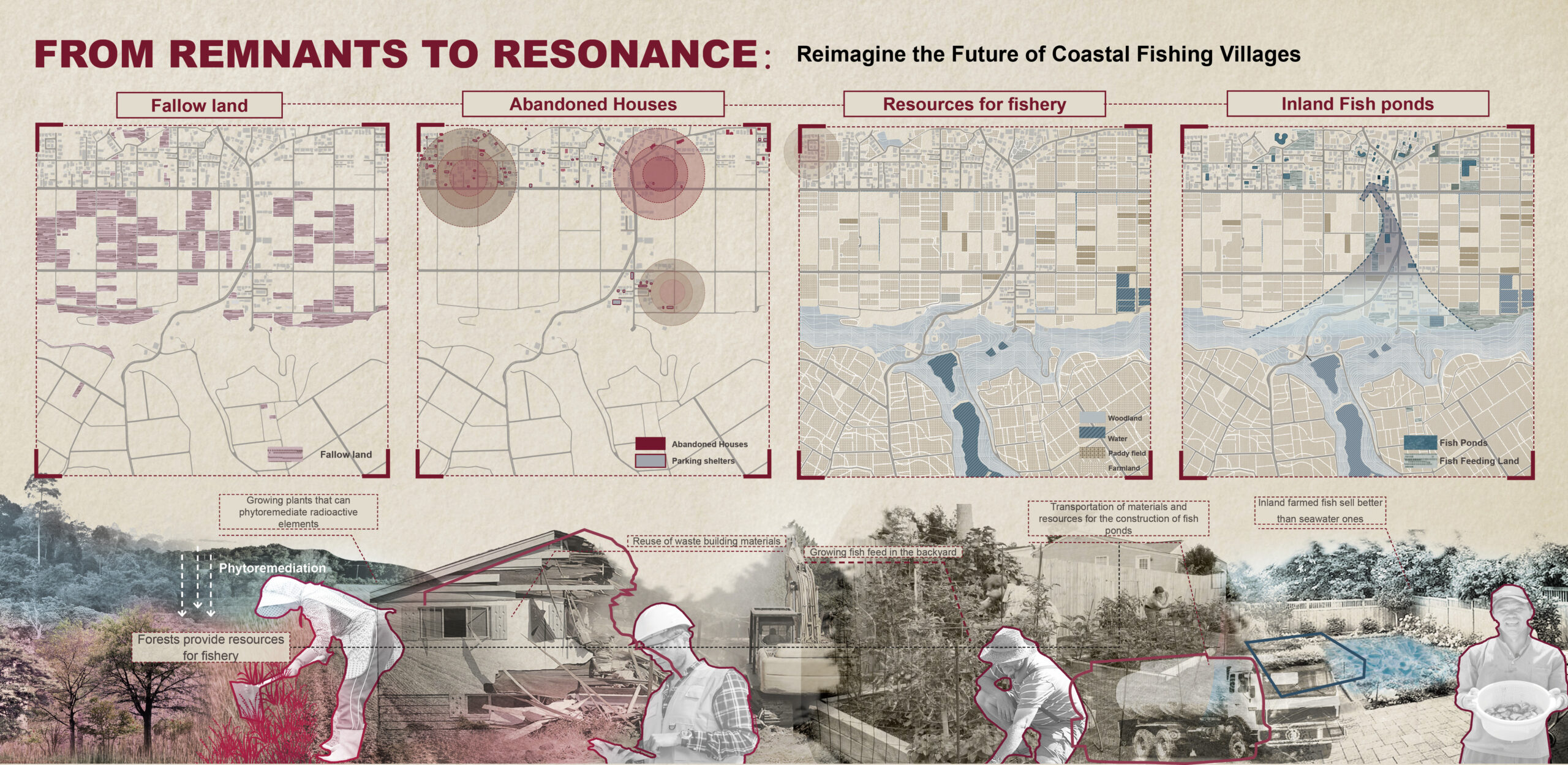
We are delighted to announce that three alumni from the Master of Landscape Architecture (MLA) Class of 2024 have won the Honor Awards (Urban Design) in the 2024 ASLA Student Awards.
Luoman Ouyang, Zhiyi Guo and Jiaxin Jiang have made the university proud with their exemplary design coursework for module LA4702 MLA Density Studio. In this module, students tackle important landscape issues in Southeast Asia, particularly those related to the region’s rapidly growing urban areas.
Their award-winning project, titled “From Remnants to Resonance: Reimagine Coastal Fishing Villages,” addresses the significant ecological and social impacts of the 2023 discharge of nuclear wastewater in Japan on the country’s fishing industry. The project envisions a sustainable future for coastal fishing villages like Choshi by transforming the coastline from remnants into resource landscapes for both humans and non-humans. The team selected a 1km-by-1km site in Choshi City as a case study to propose a new model for the future development of Japanese fishing villages.
The awards jury praised the project for its rich graphics, powerful purpose and detailed plant remediation information.
Their project supervisor, Dr Victoria Marshall, expressed her elation and shared her thoughts: “Congratulations to Luoman, Zhiyi, and Jiaxin. This award is well deserved. The strengths of the project are its multiscalar approach, imagination and representation of incremental change, and emphasis on situated landscape practices. The project also reflects the excellent level of shared learning across the MLA programme. Well done to all!”
To learn more about the project, please visit: ASLA 2024 Student Awards
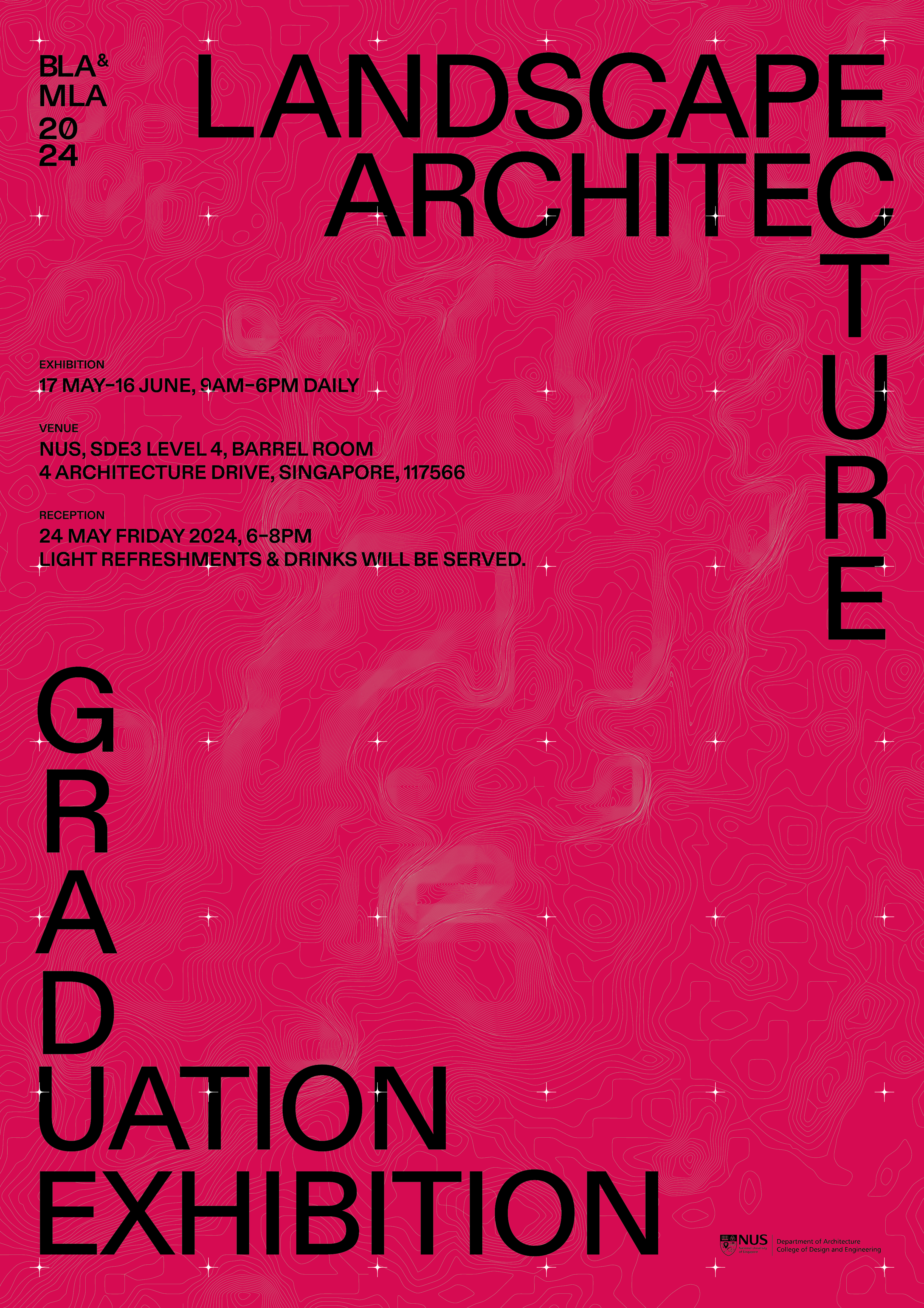
Come and join us as we celebrate the achievements of the BLA/MLA Class of 2024!
The Landscape Architecture Graduation Exhibition features the work of both Master and Bachelor students and we are thrilled to share their projects with you. This year, we proudly present the first cohort of MLA students who have completed an independent design thesis project, as well as the second graduating cohort of BLA students since the establishment of the programme in 2020.
The projects delve into advanced research and design topics that define our times, from issues of waste and consumption, landscape infrastructures, and climate change to encounters with more than humans and experiential qualities of landscapes.
You can download the Year in Review for AY2022-23 report here.
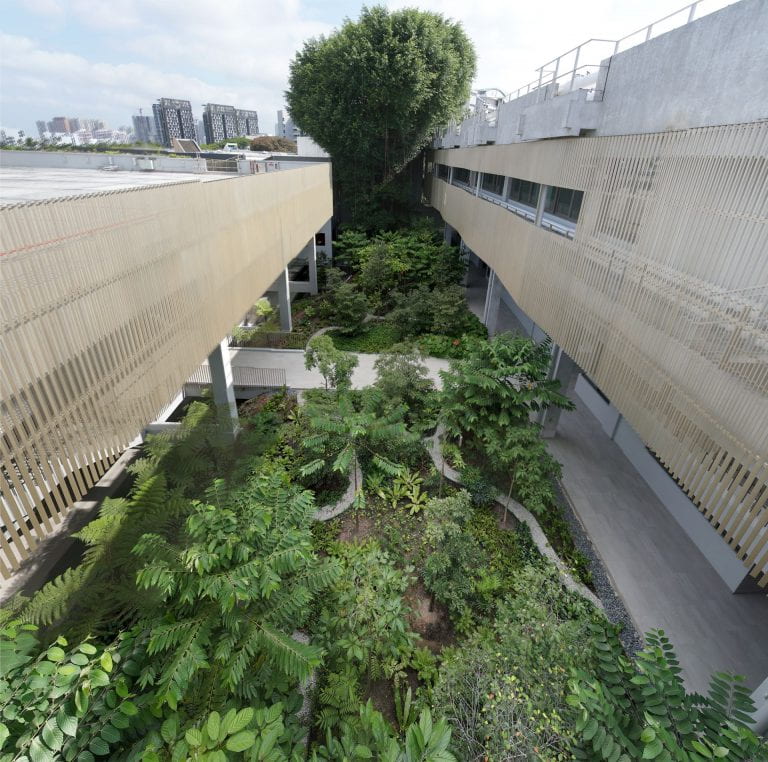
Associate Professor Yun Hye Hwang receives IFLA APR Award of Execellence 2023: Cultural and Urban Landscape Category
Landscape design project at NUS SDE building titled “Campus in a forest” is inspired by the biodiversity and ecosystem dynamics of the island’s native forests. She has strategically introduced Singapore’s primeval habitats within contemporary built environment for the opportunities for research and outdoor learning.
For more information:
https://blog.nus.edu.sg/urbanwildlab/campus-in-a-forest-_-nus-sde-landscape-project
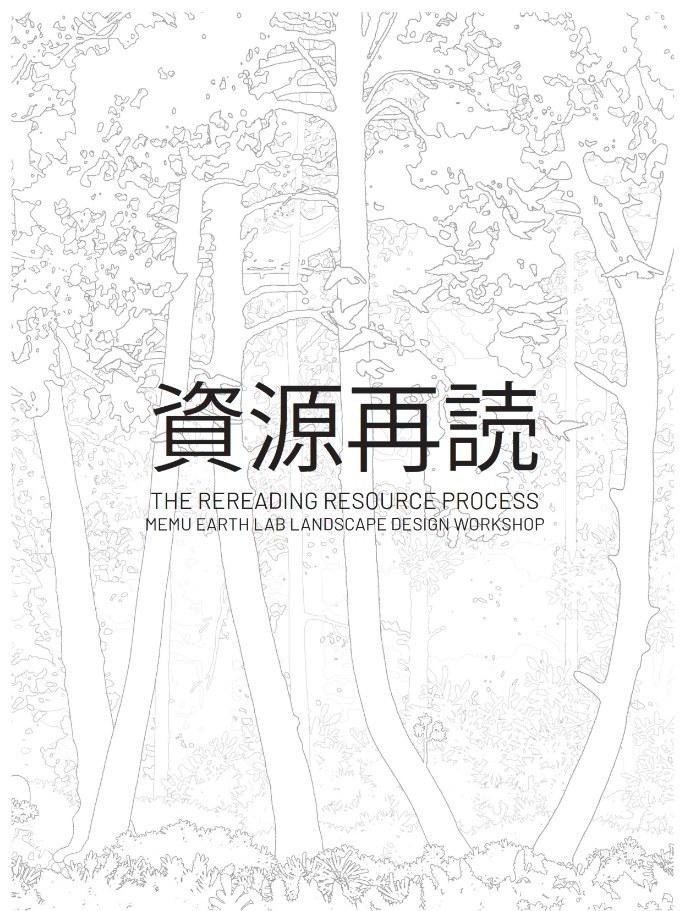
Joint summer workshop in Hokkaido with University of Tokyo students
7 students from NUS (2 BLAs & 5 MLAs) joined a design workshop in August, titled 資源再読 THE REREADING RESOURCE PROCESS @ MEMU EARTH LAB in Taiki Town, Hokkaido, Japan. This was an incredibly rare, immersive experience to understand the local resources (food, material, and people) through 5 senses. Good discussions and findings were compiled in the booklet available here:
https://issuu.com/nusdoa/docs/memu_earth_lab_landscape_design_workshop
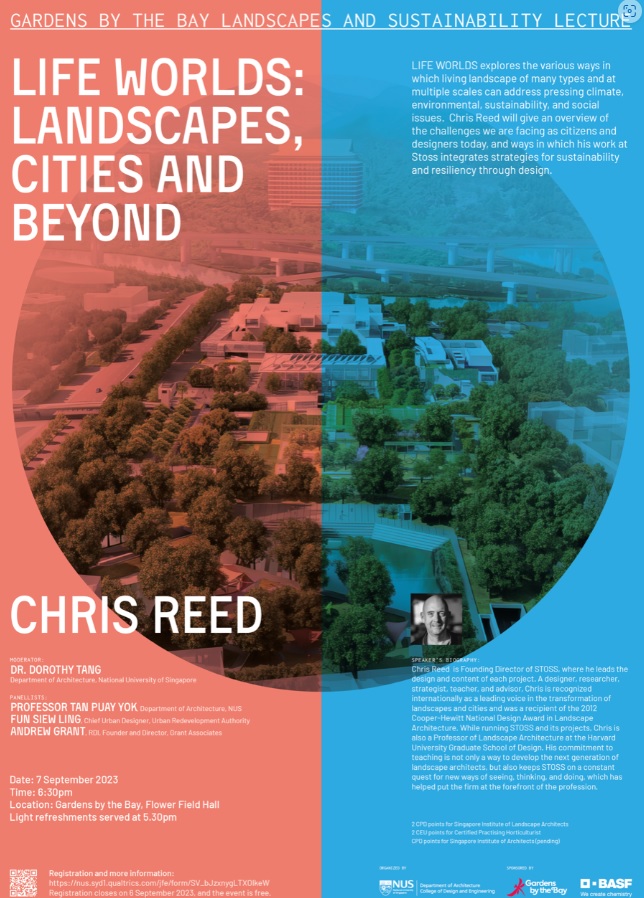
Gardens by the Bay Lecture by Prof. Chris Reed, 7th September 2023
Harvard University, Graduate School of Design Professor Chris Reed shared his views on the challenges faced by citizens and designers today and how his work at Stoss integrates strategies for sustainability and resilience through landscape design. NUS Landscape programme has organized this event, and it was moderated by Assistant Professor Dorothy Tang.
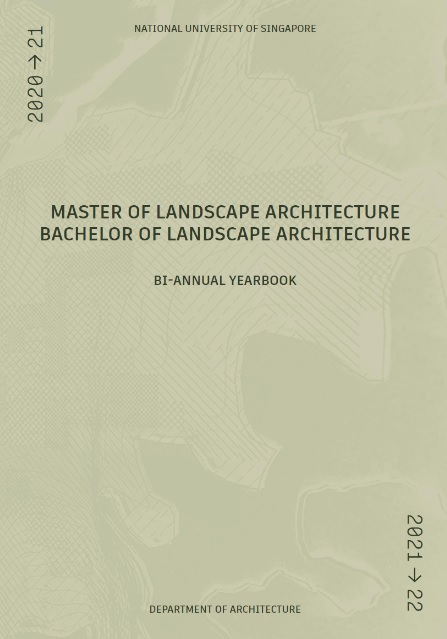
Please take a look at both BLA and MLA student works from academic year 2021-2022.
These remarkable accomplishments highlight the depth and breadth of our landscape discipline; from foundational studies to advanced research.
Find a link to the yearbook here: https://issuu.com/nusdoa/docs/nus_landscape_architecture_yearbook_2020-2022
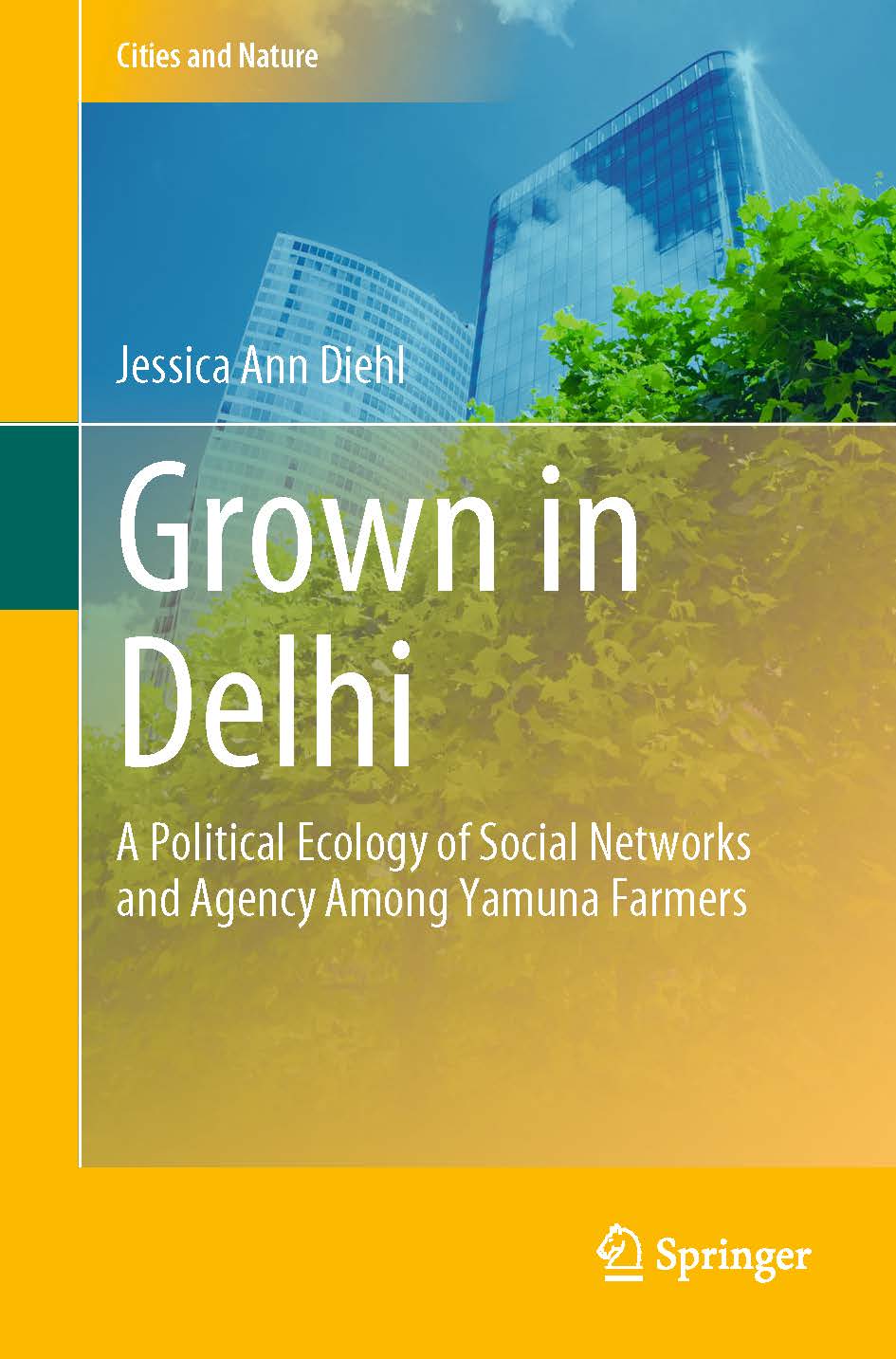
Assistant professor Jessica Ann Diehl (akijac@nus.edu.sg) has published a book titled “Grown in Delhi: A political ecology of social networks and agency among Yamuna farmers” (Springer, Cities and Nature), which explores how power relationships, measured through qualitative social network analysis, impact planning participation and livelihood strategies of a marginalized group of farmers cultivating the Yamuna River floodplain in Delhi, India. Through an in-depth study of 165 farming households facing land development, this book offers insights from the ground-up into how social dynamics enable and constrain agency. A novel mixed-methods approach was used to measure social networks and access to resources based on the different types of people farmers might interact with as part of their livelihoods: hired laborers, vendors, other farmers, etc. Digging deeper into social network patterns, typologies of power are illustrated as they manifest household agency through diverse pathways. More broadly, a political ecology lens is used to link together the multiple and fragmented Yamuna farmers’ stories with broader social, ecological, infrastructural, and economic contexts to suggest future directions for inquiry and policy related to localized urban food systems and sustainable development.
Find a link to the book here: https://link.springer.com/book/10.1007/978-3-031-26380-4

SILA’s Singapore Landscape Architecture Awards 2022 ceremony was held on 12th December. Please congratulate our alumni for their achievements!
Young Landscape Architect of the Year Award 2022::
Winner: Mayura Patil (MLA class of 2014)
Jury recognition: Nur Syuhada Limat (MLA class of 2012)
Honourable mention: Hoo Xin Yu (MLA class of 2011)
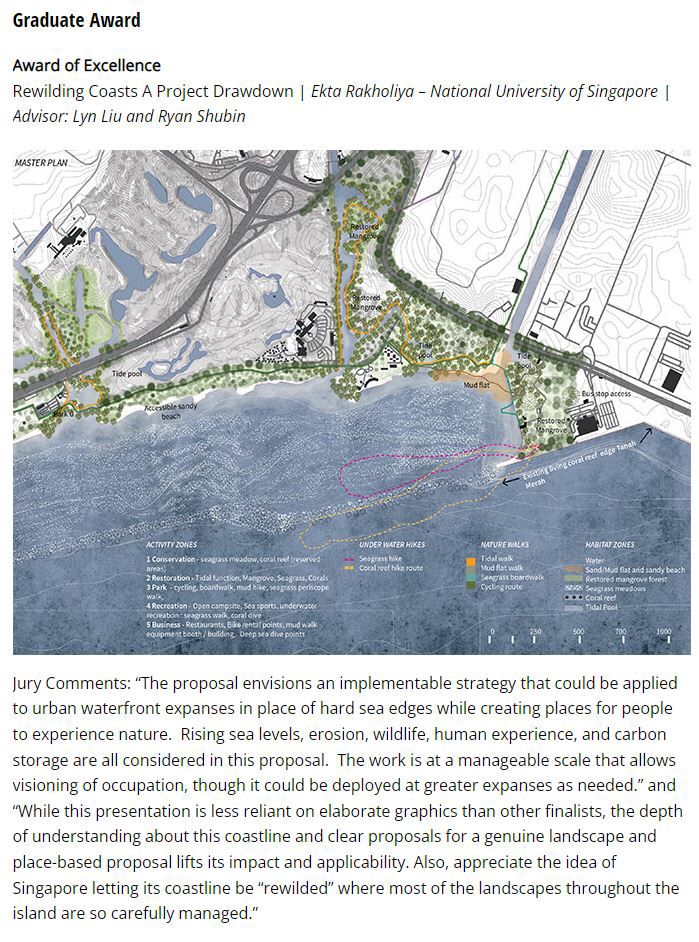
Congratulations to NUS MLA Ekta Rakholiya (class 2021) for winning the 2022 Student World Landscape Architecture Award!
Graduate Award, Award of Excellence; “Rewilding Coasts A Project Drawdown”, supervised by Ryan Shubin and Huei Lyn Liu.
For more details, please visit:
https://worldlandscapearchitect.com/2022-student-wla-award-winners/
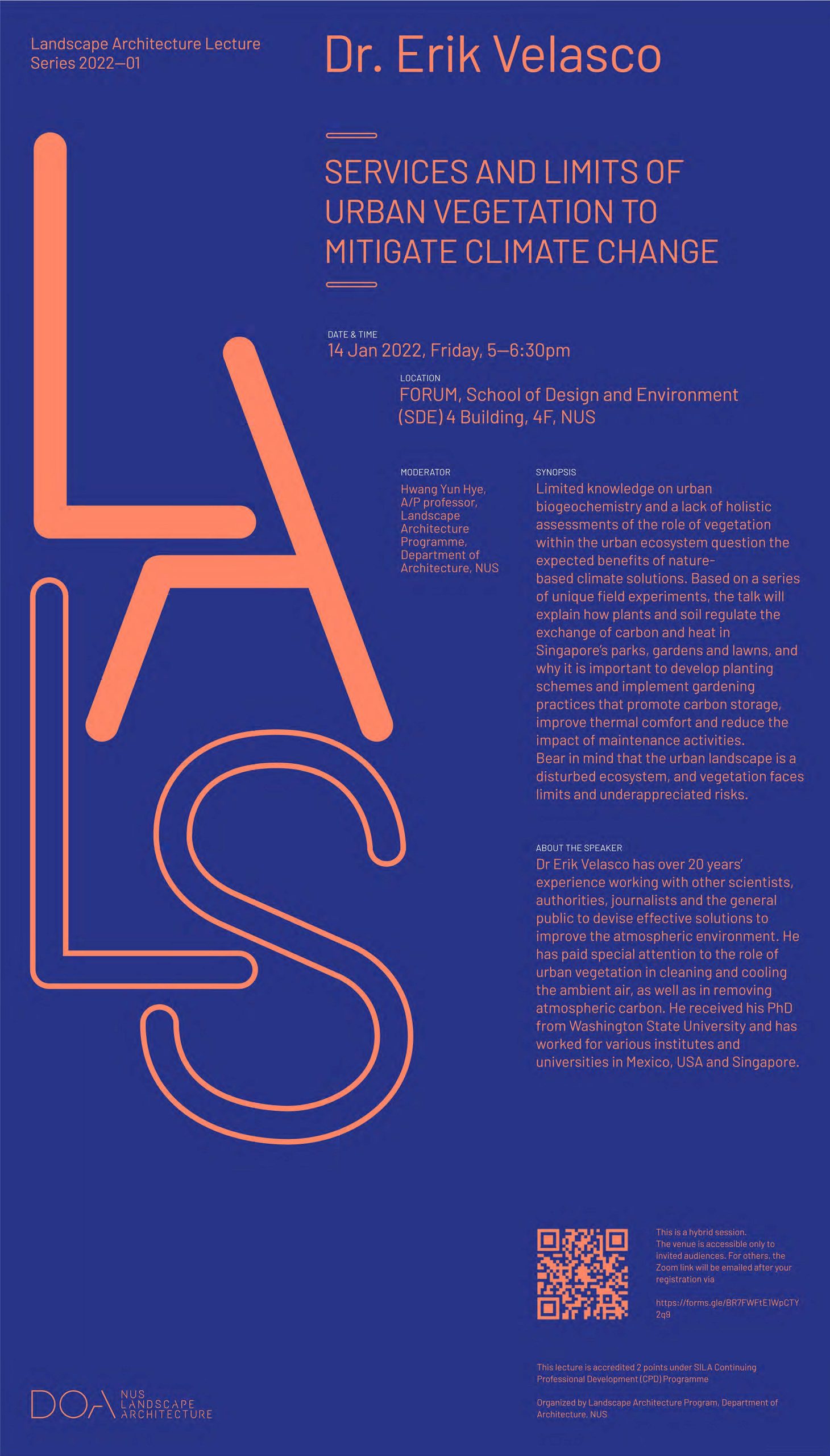
Date: 14 Jan, 2022 (Friday)
Time: 5:00 PM – 6:30 PM (Singapore Standard Time)
Registration link: https://forms.gle/mfG7VbPZfqyyQvCr8
Location: FORUM, School of Design and Environment (SDE) 4 Building, 4F, National University of Singapore*
*This is a hybrid session. The venue is accessible only to invited audiences. For others, the Zoom link will be emailed after your registration
Course Fee: Free
SILA CPD points: 2
About the event
Limited knowledge on urban biogeochemistry and a lack of holistic assessments of the role of vegetation within the urban ecosystem question the expected benefits of nature- based climate solutions. Based on a series of unique field experiments, the talk will explain how plants and soil regulate the exchange of carbon and heat in Singapore’s parks, gardens and lawns, and why it is important to develop planting schemes and implement gardening practices that promote carbon storage, improve thermal comfort and reduce the impact of maintenance activities. Bear in mind that the urban landscape is a disturbed ecosystem, and vegetation faces limits and underappreciated risks.
About the Speaker
Dr Erik Velasco has over 20 years’ experience working with other scientists, authorities, journalists and the general public to devise effective solutions to improve the atmospheric environment. He has paid special attention to the role of urban vegetation in cleaning and cooling the ambient air, as well as in removing atmospheric carbon. He received his PhD from Washington State University and has worked for various institutes and universities in Mexico, USA and Singapore.
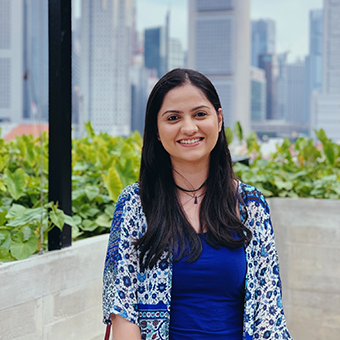
Poornima Bargotra, MLA Graduate in 2021, Received the Gardens by the Bay Award
It is my honour and privilege to be receiving the Gardens by the Bay Prize! This achievement would not have been possible without the constant support from my extremely talented peers and encouragement from all the inspiring professors throughout these two years. I feel deeply motivated to continue building upon the strong foundation of the MLA programme which has been extremely enriching and eye-opening. It has taught me to critically question, analyse and explore design solutions for more meaningful and resilient landscapes while respecting the intricacy and complexity of the natural environment. The programme further emphasised the importance of staying strongly grounded in the socio-cultural and ecological context which can better enhance the quality of the community’s interaction with nature and the built environment.
It has been one crazy journey, especially during these trying times but I feel extremely thankful to have met some passionate people in the field who have motivated and guided me along the way. I feel excited and ready for whatever lies ahead!
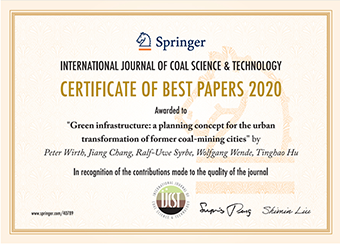
Springer’s Best Papers Award 2020
The International Journal of Coal Science & Technology has honoured Wolfgang Wende, Visiting Associate Professor, together with scientists from the Leibniz Institute of Ecological Urban and Regional Development, Germany and the China University of Mining and Technology (Xuzhou) with its “Best Papers 2020” certificate. Wolfgang and his co-authors received the award for the article “Green infrastructure: a planning concept for the urban transformation of former coal-mining cities” (2018).
Please visit here for more details on the article.
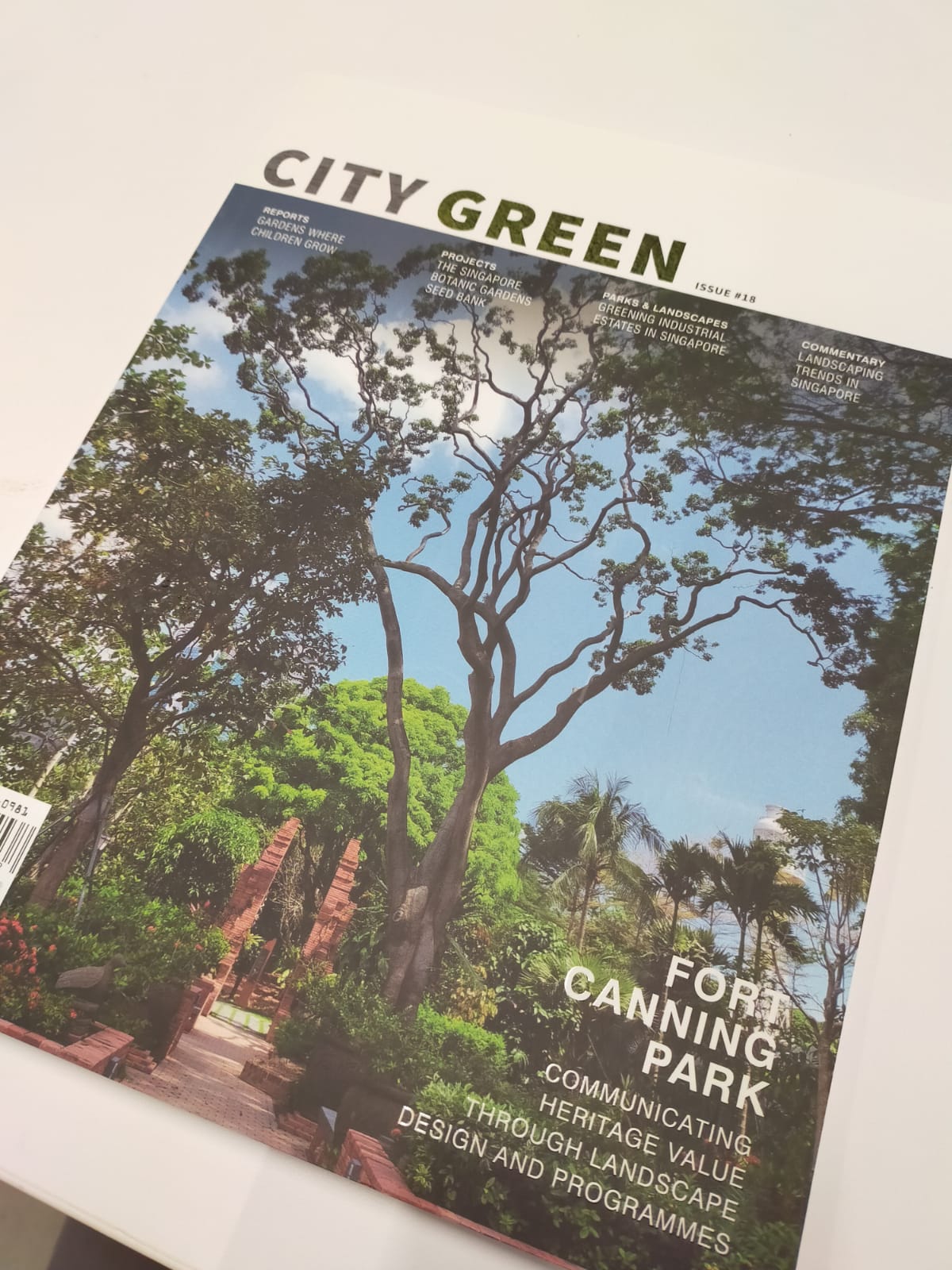
Associate professor Yun Hye Hwang, lecturer Kenya Endo, and visiting consultant Dr. Shawn Lum, have published an article titled “Rewilding Singapore: Exploring Landscape Design Strategies that bring Forest Ecology into The Urban Context” in the City Green magazine #18 by Centre for Urban Greenery and Ecology. Referring to student works and the learnings from the MLA studio; Rewilding Singapore (AY2019-20 Sem1), the article argued the potentials and design approaches of introducing tropical ecologies into our urban environments.
Please visit here for more details on the article.
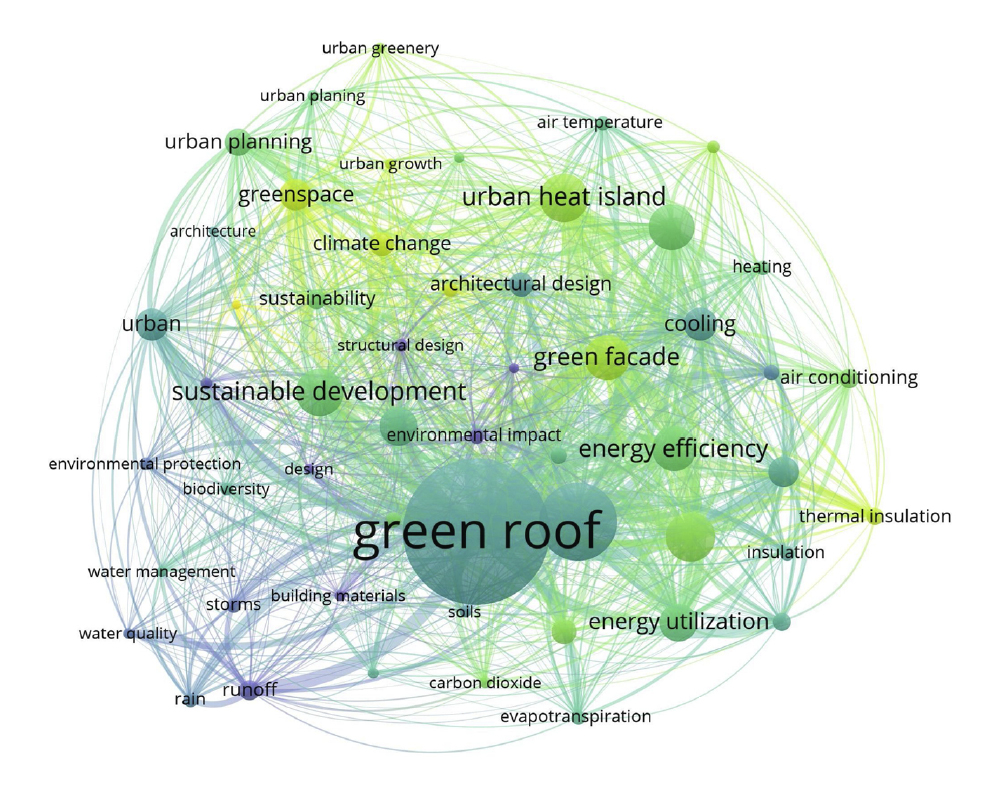
Terrence Tan CL, Senior Lecturer of Landscape Architecture, has co-authored a paper titled “Trends and gaps in global research of greenery systems through a bibliometric analysis” in Sustainable Cities and Society (SCS). A bibliometric analysis regarding greenery systems was carried out with 1918 documents found in the Scopus database for the 1974–2019 period. Research trends and main knowledge gaps were analyzed.
Please visit here for more details on the paper.
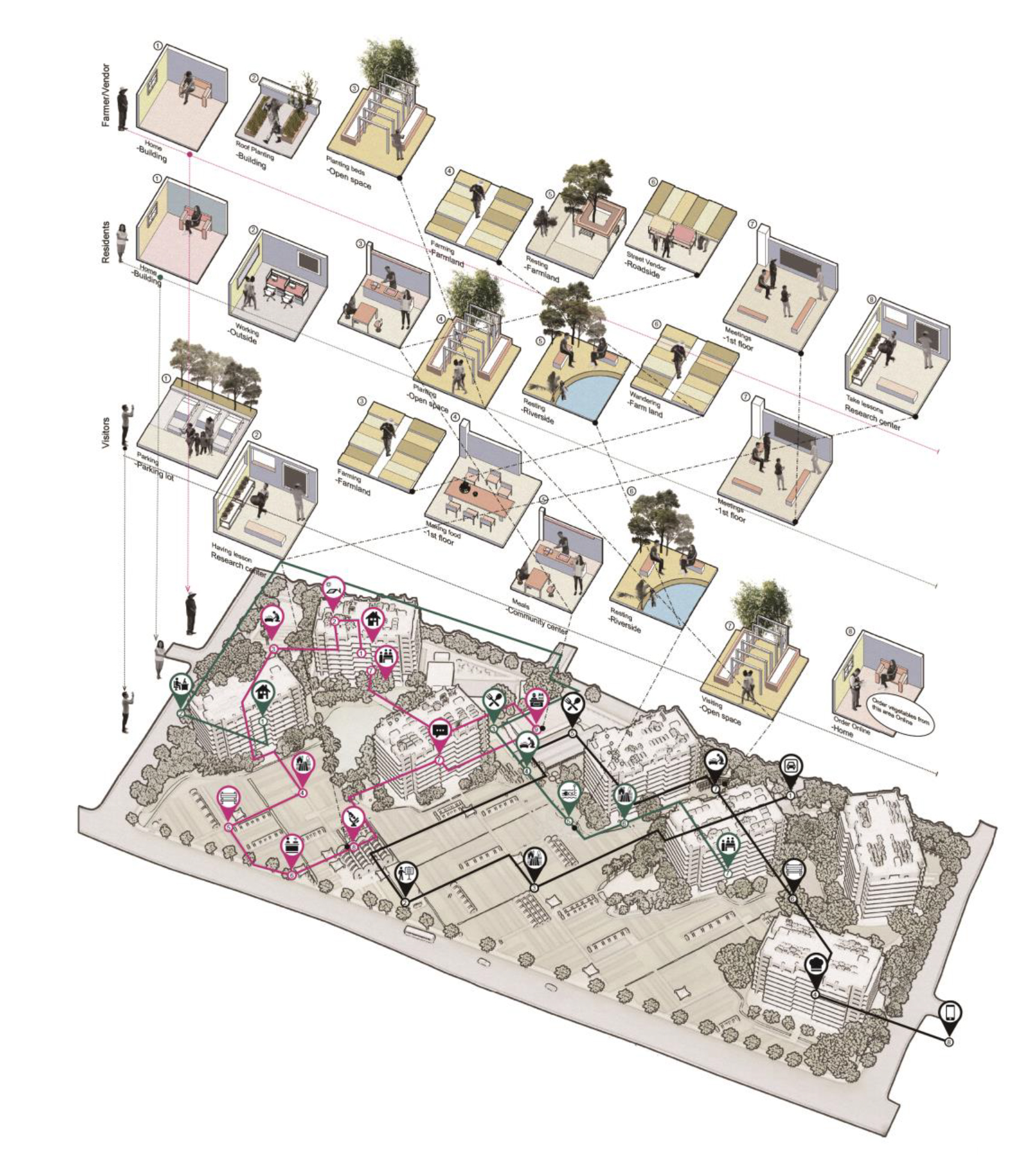
Senior lecturer Ervine Lin and lecturer Kenya Endo have published a paper titled “Recovering Public Space in Jakarta – A Landscape Architectural Approach” in the 3rd International Conference on Dwelling Form, organized by Department of Architecture, Universitas Indonesia. Referring to student works and the learnings from the MLA studio in Jakarta (AY2019-20 Sem2), the paper argued the perspectives and roles of landscape architects in socio-culturally diverse Asian mega cities.
Please visit here for more details on the paper.

Lecturer Kenya Endo has collaborated with PUB (Urban Liveability Division) and World Bank (Urban Disaster Risk Management) teams to run a community session at Understanding Risk 2020 online forum. The session included a virtual tour of 4 featured ABC projects in Singapore that demonstrate solutions to (1) mitigate the impact of heavy storms, (2) detain and treat stormwater runoff, and (3) achieve social and environmental co-benefits. 360-degree images were introduced as part of immersive learning experience.
Please visit here to learn about Integrated Green Infrastructure and Nature-Based Solutions for Urban Flood Resilience in Singapore.
Visit here for the details of UR2020 forum.

We invite you to join us as we celebrate 10 years of NUS Master of Landscape Architecture 2009-2019, on 23 October 2020 (Singapore time, 5 – 6.30pm), in a virtual webinar to mark this important milestone for the Master of Landscape Architecture at the National University of Singapore.
Click here to read more.
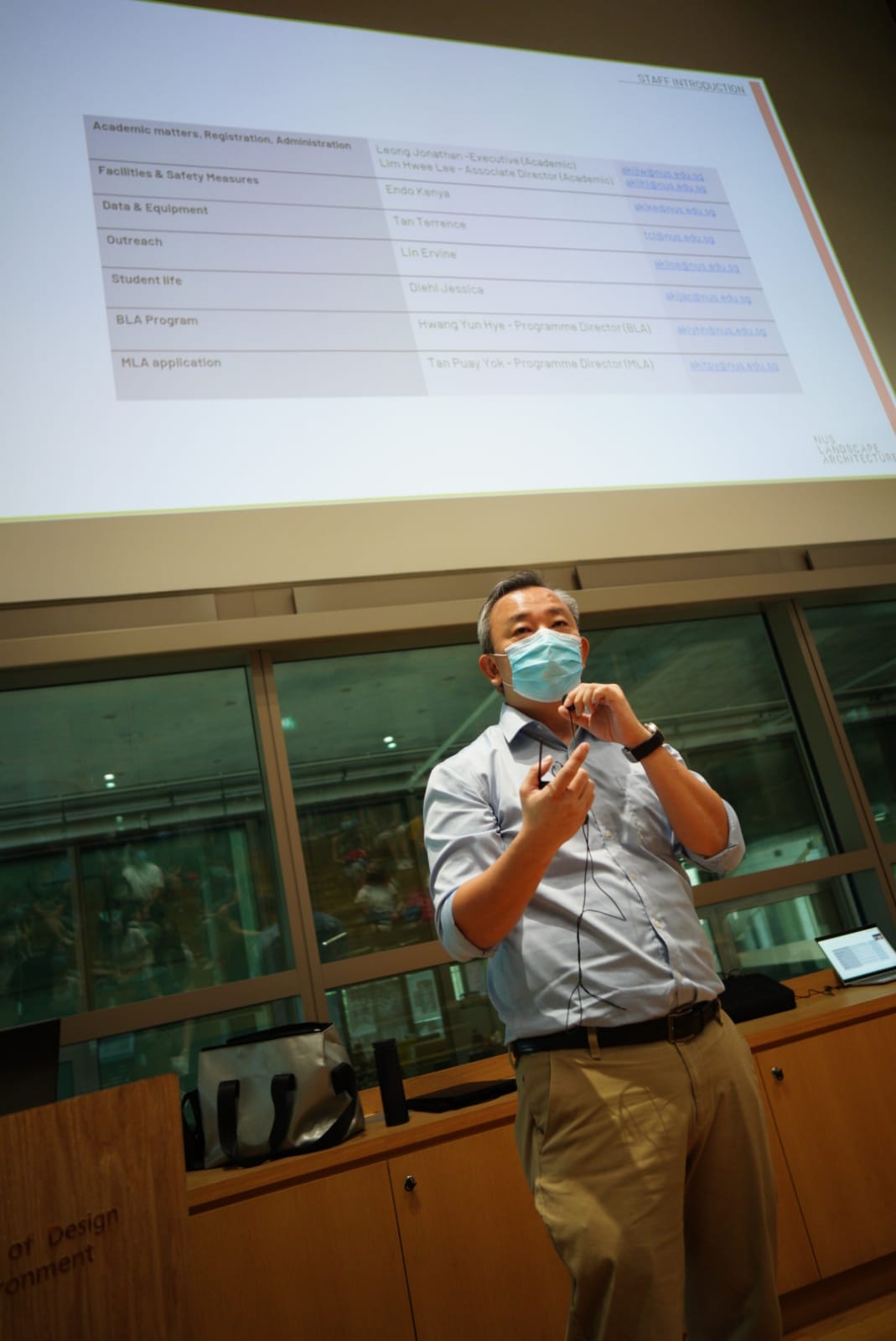
Warm welcome to new MLA Y1 students and returning Y2 students!
We were happy to see 30 new students joining the MLA programme on the August 6th orientation day. We are certain that this new academic year will be fruitful one for all.

Congratulations to our faculty member, Dr Shawn Lum for receiving Public Service Medal.
Please find more information at:
https://www.straitstimes.com/singapore/sharing-insight-on-water-issues-shawn-lum

ELSA SIM RUI JIA, MLA GRADUATE IN 2020, RECEIVED THE GARDENS BY THE BAY AWARD
It is my honour and privilege to be receiving the Gardens by the Bay award, which would have been impossible without my professors, mentors, schoolmates, friends and loved ones who have supported me. I remember the very day I submitted the application to commit to specialise in Landscape Architecture. It was a decision that felt so right in the gut, even when I didn’t fully comprehend what the profession entails. Since then, my journey in NUS MLA has been humbling, enjoyable and eye-opening, as I begun to be exposed to the ways landscape architecture can meaningfully impact our built environment. I am very thankful for the passionate people I have met along the way in this journey who inspired, guided, motivated and walked alongside me. I am deeply encouraged and excited to continue building on the foundation the MLA programme has provided me with to critically question, inquire and explore design solutions for better landscapes in the future.
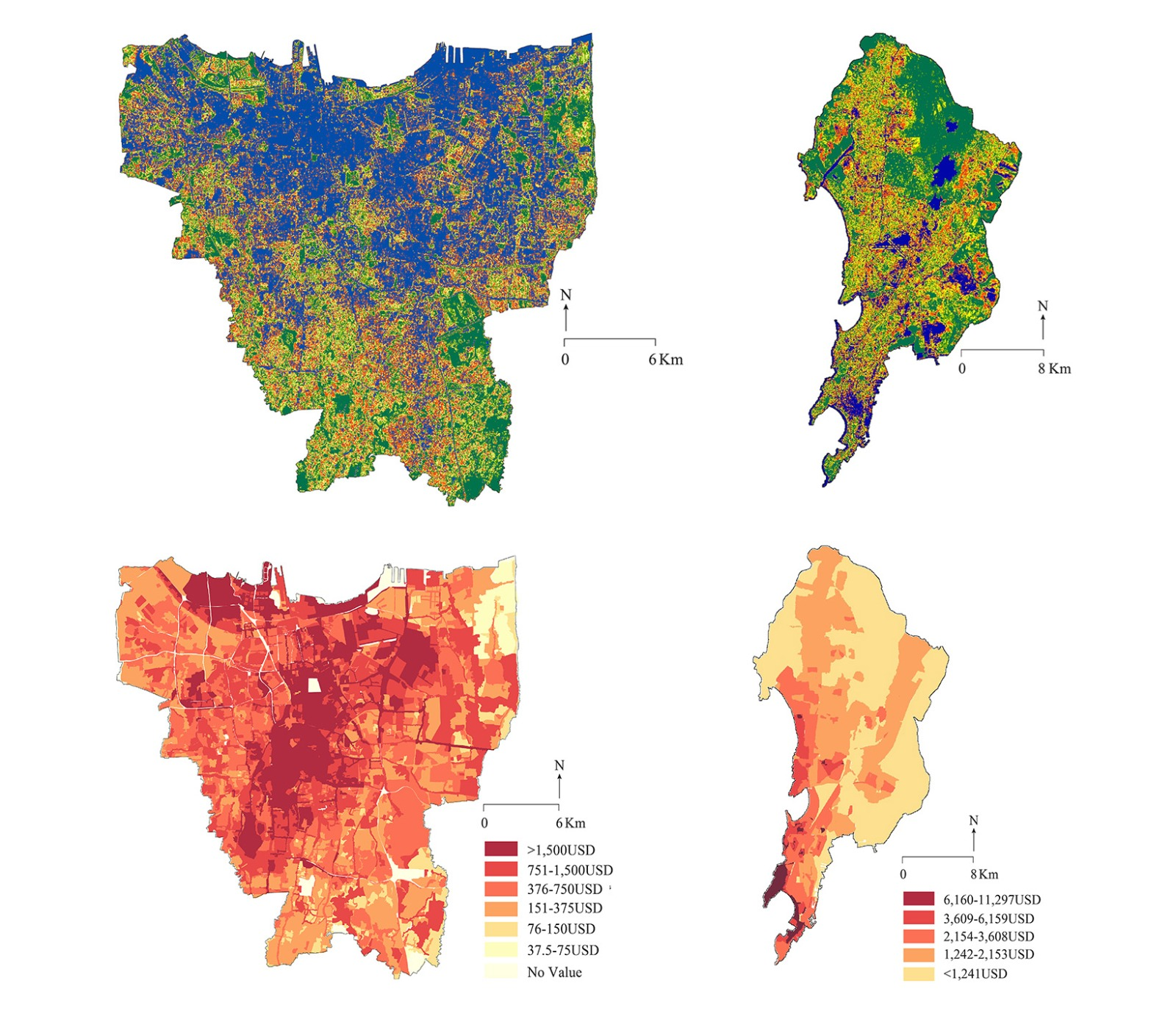
Yun Hye Hwang, Associate Professor of Landscape Architecture, has co-authored with Deepika Amonkar (MLA 2016) in Journal of “Sustainability”
The article, entitled “Urban Green Space Distribution Related to Land Values in Fast-Growing Megacities, Mumbai and Jakarta”, found that the lower land value districts had more vegetation coverage with a higher vegetation density, mainly due to a large quantity of unmanaged greenery. The paper argues to optimize the use of unmanaged UGS as a socioecological asset for poorer districts, and point to the practical consequences of incorporating the study’s findings into policy and planning towards the creation of ecologically inclusive cities.
Please take a closer look from here!
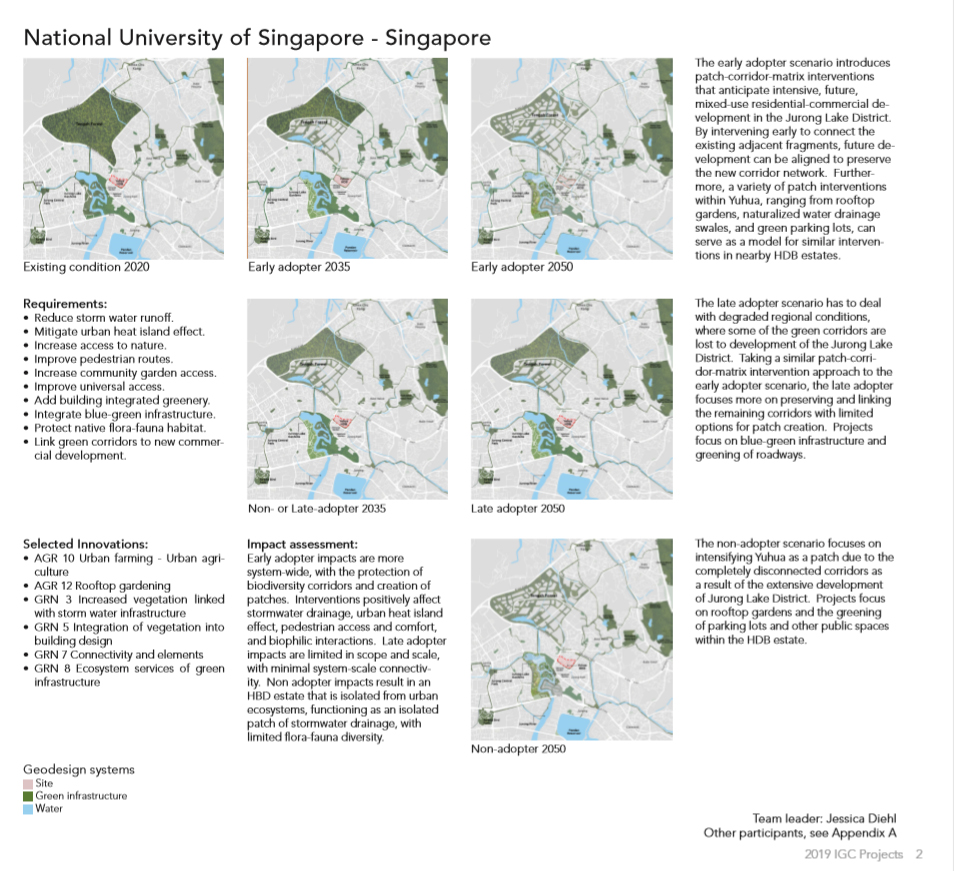
MLA 2020 student works from Geodesign LA5301 were compiled into a single submission poster on display at the 2019 International Geodesign Collaboration (IGC) meeting, which is now included as one of the case studies in the recently published book by ESRI: “The International Geodesign Collaboration: Changing Geography by Design.” The project was titled: Enhancing ecosystem services in Housing Development Board Estates – Singapore.
Please visit here for more details on the book.
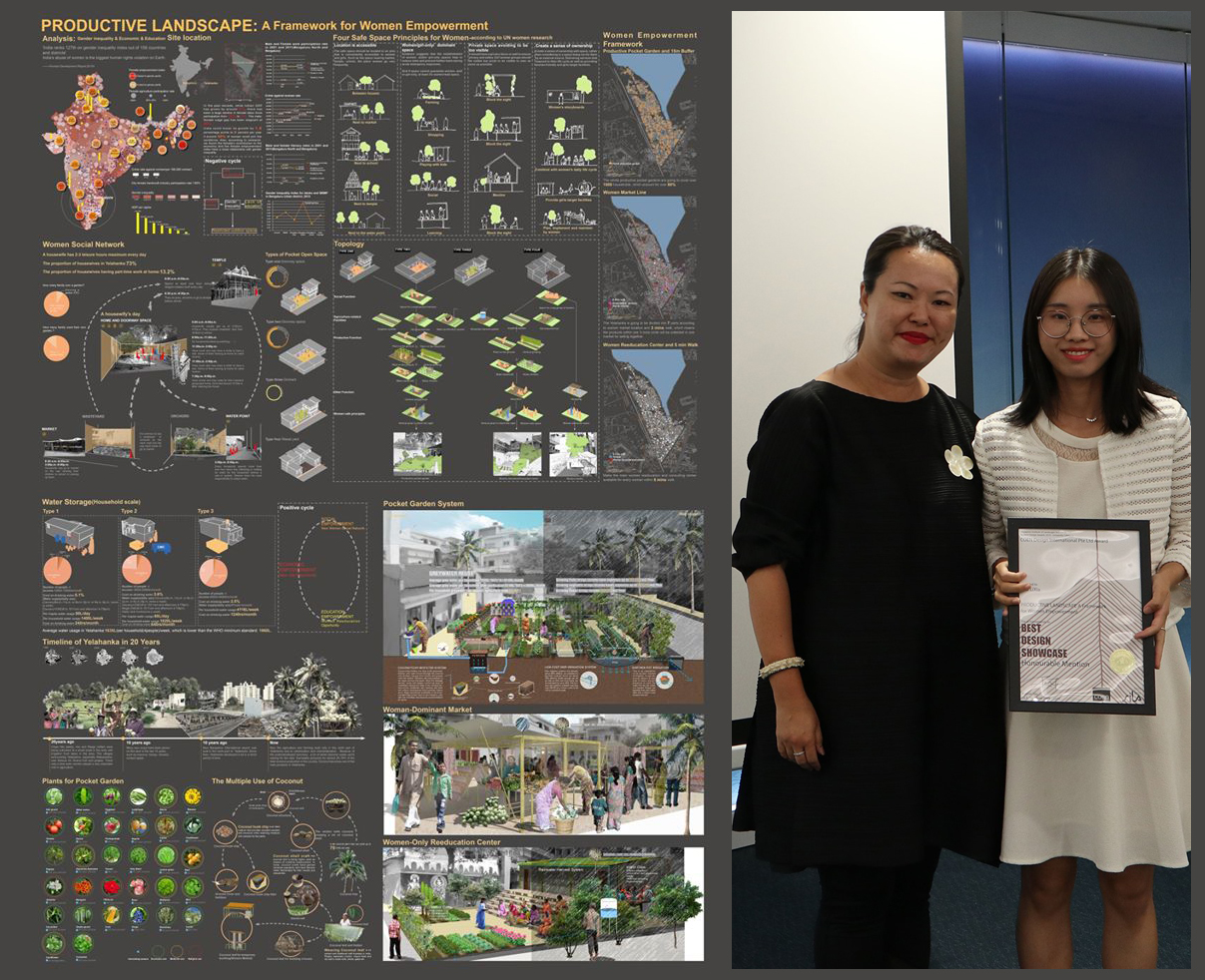
Project of Lixia Bao (MLA 2020) from the MLA Studio LA4702: Landscape of Necessity – Re-envisioning Productive Urban Landscapes, a Community-based Design Studio in Yelahanka, Bangalore, was awarded by SILA’s Student Design Award 2019.
Productive Landscape A Framework for Women Empowerment
SILA STUDENT DESIGN AWARDS 2019 Winner, Best Design Showcase (Honourable Mention)
Award ceremony photo credit: SILA
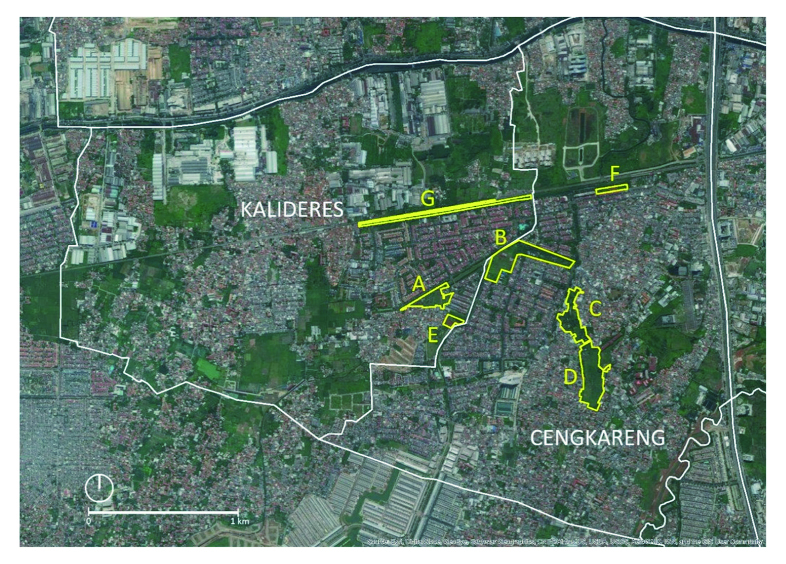
Jessica Diehl, Assistant Professor of Landscape Architecture, has co-authored with Amanda Chandra (MLA 2019) in journal of “Land Use Policy”. The article, entitled Urban agriculture, food security, and development policies in Jakarta: A case study of farming communities at Kalideres – Cengkareng district, West Jakarta, argues that in order for the government of Jakarta to generate policies which support the continuity of diverse urban agriculture practices, there is a need to systematically understand different typologies of urban agriculture across form and function.
Please visit here for more details on the paper.

Kenya Endo, Lecturer of Landscape Architecture, has written 2 short essays for International Federation of Landscape Architects, Asia Pacific Region’s online newsletter, as part of his Detail Design LA5302 module.
Please visit here for article on Singapore’s City in Nature vision by referencing Jurong Lake Park project.
Please visit here for article on integrating hydro-calculation with landscape design.
Here’s a snippet of our interview with recent MLA graduates, Pearlyn (MLA 2017), Ashley (MLA 2018), and Victor & Helen (MLA 2019).
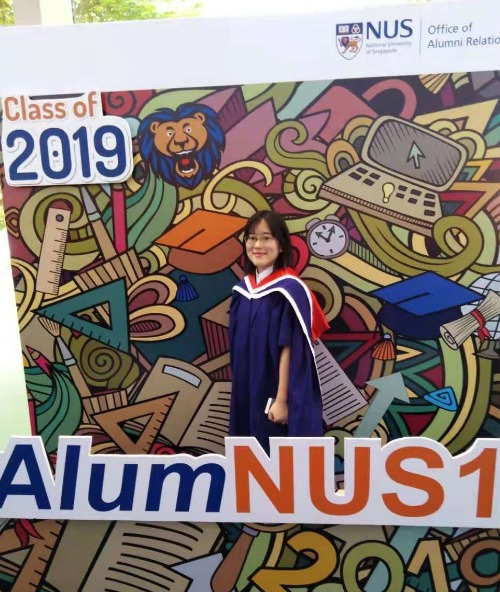
Being able to do landscape architecture, to me, is something exciting enough. Recalling back upon our two-year MLA journey together, I also found it incredible how different wonderful people have spoken to me in this experience. Coming out of comfort zones, making mistakes, taking courage, testing out ideas… like every one of my classmate, we have each made our own gains and improvements in this learning. Thanks to all the explorations and discussions, questions and inspirations we have had, which would always remind me of that passion and devotion of getting through the design task. Very importantly, big thanks to our beloved professors of their commitments in professional and personal ways! What they have influenced me with is not only technical competency, but also that attitude and thinking approaches, of addressing real-world issues in even higher complexity and necessity.
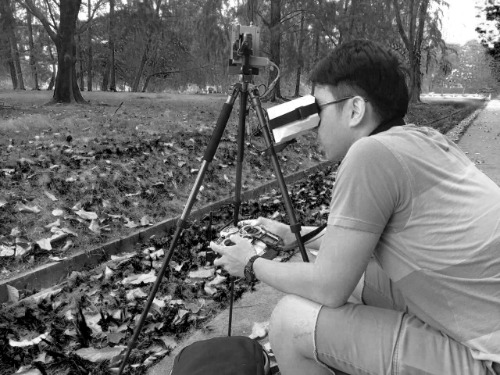
Prior to his appointment, Dr Lin was a researcher at CUGE (National Parks Board, Singapore) after completing his doctorate with the ETH Zurich. Welcome him to join the programme!
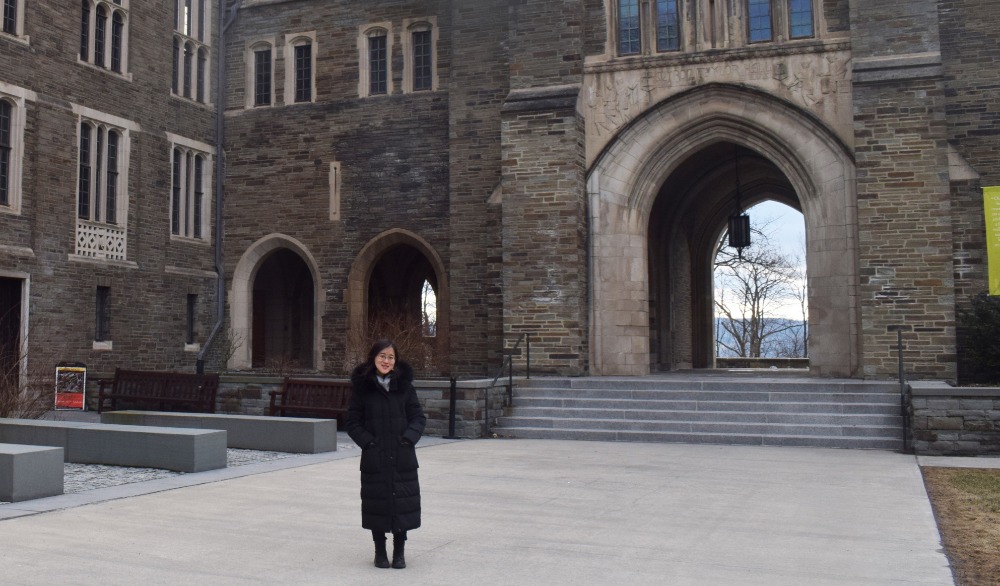
Fan Lei Helen (MLA Year 2) is currently under her exchange programme in Cornell University, during January – May, 2019. It has been an exciting shift of study and living environment for me, from the highly urbanised tropical metropolitan of Singapore to a nature-featured suburban town of Ithaca. The training in Cornell also provides interesting diversifications from what I was equipped with in NUS, in terms of issues addressed and approaches for design. We are currently studying into the unique characters and hazards projected of the 34 harbourfront islands of Boston city, in strategising design for their identities as national park and frontier tackling of future climate change. I also got opportunities to learn about design software of Rhino and grasshopper, and an extensive variety of temperate plants and their usage. Additionally, you would never be too surprised by the personalities and expressiveness in American culture!
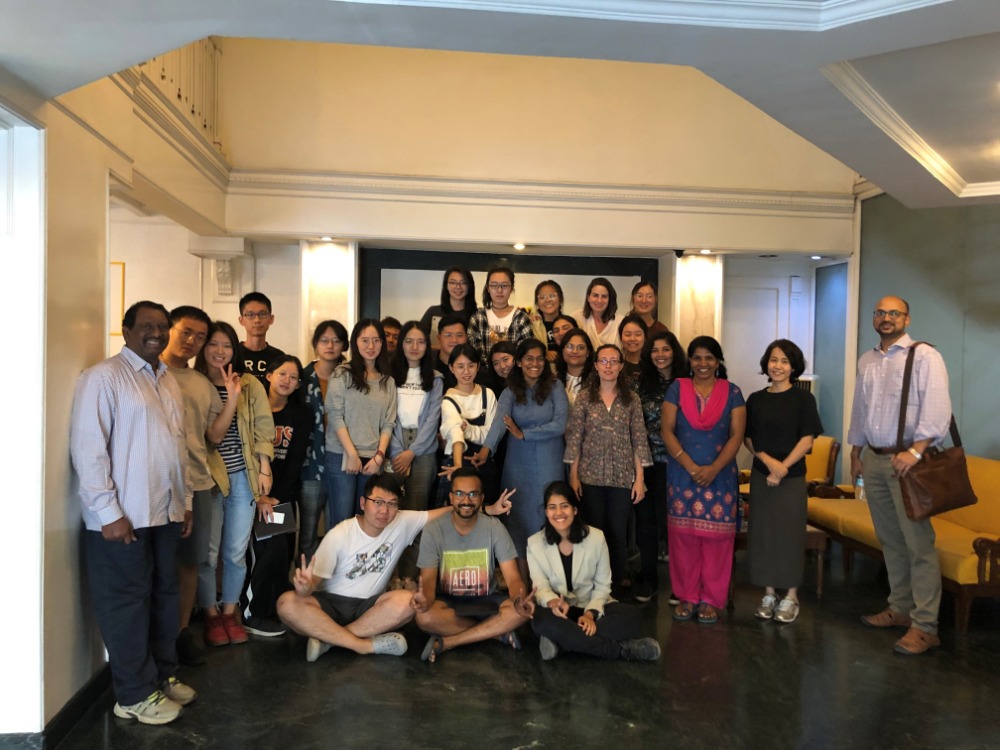
MLA Year 1 students travelled overseas to India 26 Jan to 4 Feb 2019 with Asst. Profs. Jessica Diehl and Hwang Yun Hye for a site visit as part of their studio project. Yelahanka and Hebbal Kempapura were selected as the landscape design sites; both located in north Bangalore, one of the most rapidly urbanizing cities in India. The topic, “Landscape of Necessity,” focuses on the critical resources of food and water through the design of blue-green infrastructure and productive urban landscapes. Students met with local experts and landscape architects, completed field investigations, and conducted community surveys and engaged in informal dialogs with local residents to better understand social and ecological systems as well as spatial conditions of the two sites. Both locations represent unplanned formal settlements with culturally diverse and vibrant communities experiencing environmental degradation and loss of vital ecosystem services. Through this design project, students address complex urban design issues with an emphasis on deriving innovative design solutions using ecological and sustainability principles. Students are in the process of developing design strategies to integrate blue-green infrastructure and/or productive landscapes into the built, ecological and social urban systems with the aim of envisioning better work, live, and play environments.
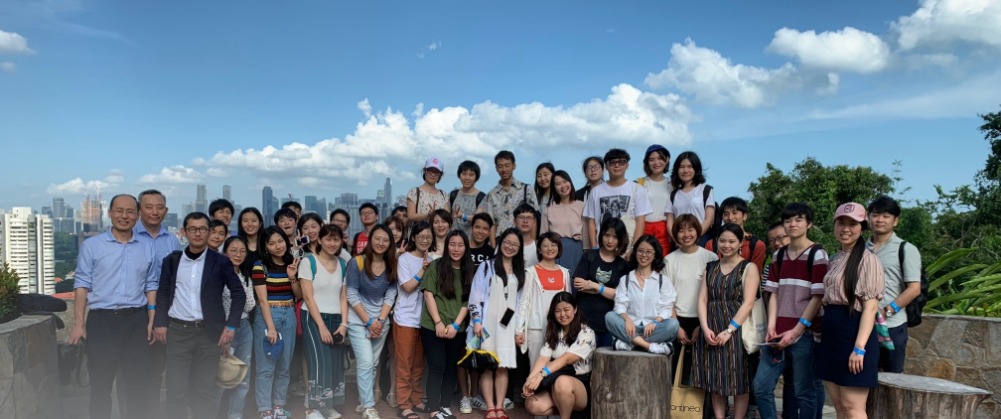
The NUS MLA programme hosted an international workshop with the landscape architecture students from Chiba University and Tsinghua University from 22 Feb to 3 Mar 2019. The workshop explored the roles of landscape in the redevelopment of Pulau Brani, Sentosa and the Greater Southern Waterfront. The workshop was supported by briefings and site visits hosted by the Sentosa Development Corporation, Urban Redevelopment Authority and Gardens by the Bay. The participants from the three universities leveraged on the rich and manifold contributions of landscapes in the social, ecological and economic dimensions of the sites and their immediate region, and proposed a series of innovative conceptual schemes focusing on establishing Pulau Brani as a jewel in the necklace of development around the Southern Waterfront, a unique ecologically-themed MICE destination, a microcosm of Singapore as a SMART green city, and an everlasting port city which functions as a global hub for exchange and incubation of ideas. This workshop also marked the end of a five-year collaboration that has seen students participating in annual landscape architecture workshops in Tokyo and Singapore.
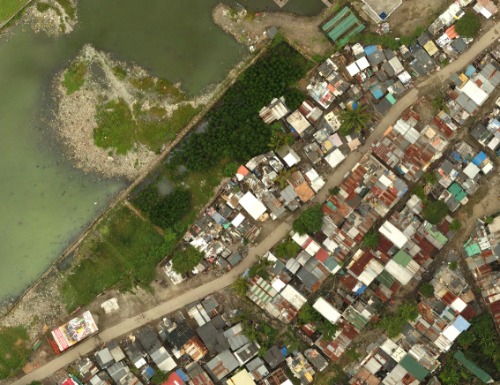
A documentary project ‘Baseco Kabalikat Mangrove, Manila’ by Asst. Prof. Hwang Yun Hye and Senior instructor Feng Yuan Qiu received double hoborable mentions for 2018 SEED + Pacific Rim Award. It has been announced in
https://designcorps.org/seed-awards-about/
and the detailed project summary is available for download here:
https://drive.google.com/file/d/
1Ijf3kY1Rpf2nHwQlCIu-o8BHyTp3xHp5/view
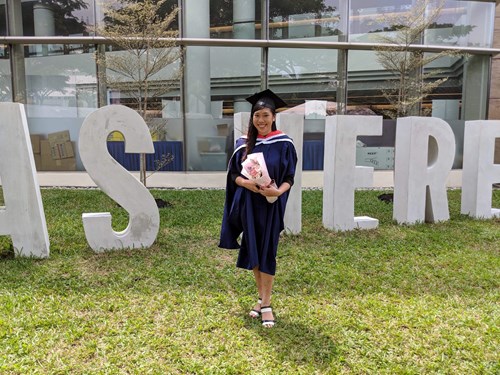
“I am pleased, honoured and humbled to have receive the Gardens by the Bay Award. The two years of MLA has been an extremely fruitful experience. I went to countries like Japan, Indonesia, Malaysia and China, and mingled with landscape students of different backgrounds. All in all, I thoroughly enjoyed the MLA programme, as it allowed students to explore landscape design on an exploratory, experimental approach supported with a strong professional underpinning. The experience was nothing short of inspirational and I enjoyed every moment of it.”
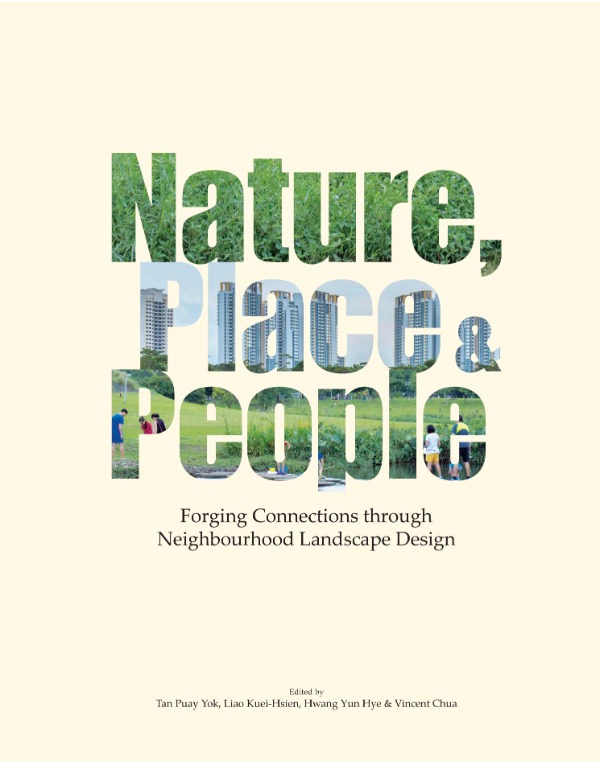
A new book, titled “Nature, Place & People. Forging Connections through Neighbourhood Landscape Design” has been published by Assoc. Prof. Tan Puay Yok and Asst. Prof. Hwang Yun Hye, together with other team members of a recently completed research project. The book centres on the importance of neighbourhood landscapes to the environmental and social qualities of high-density built environment. It articulates a set of design framework, design strategies, and guidelines to optimize the value of neighbourhood landscapes, centred on the idea that urban ecosystem services provided by natural and constructed ecosystems within neighbourhoods should be more usefully harnessed through thoughtful landscape design. The book was launched at the World Cities Summit in July 2018 by Minister for National Development Development, Mr. Lawrence Wong. It has been published Open Access and is available for download here: https://www.worldscientific.com/
worldscibooks/10.1142/10879.
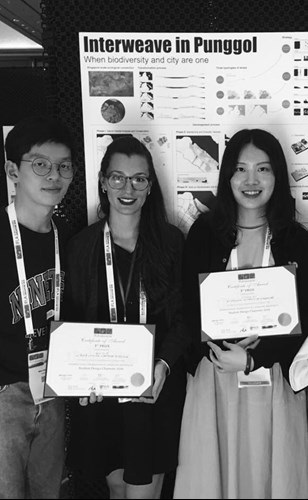
Yitong (MLA 2018)’s team project ‘Interweave in Punggol’ received the first prize with S$1,500 in IFLA 2018 student charrette. Congratulations!
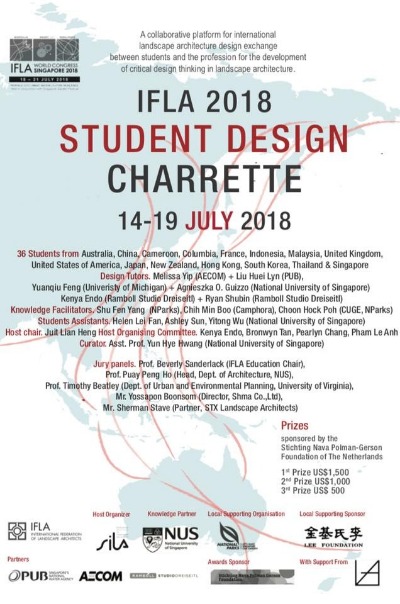
Asst.Prof. Hwang Yun Hye, lecturer Endo Kenya, Melissa Yip and Feng Yuanqiu, together with MLA student assistants successfully hosted IFLA student charrette 14-17 July, National University of Singapore.
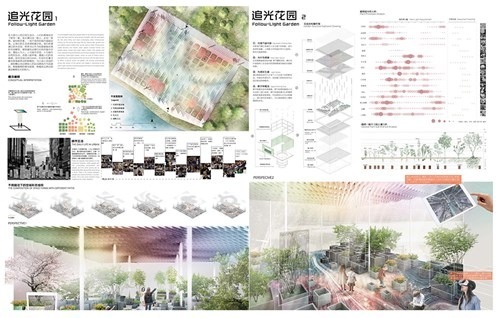
NUS MLA students won a prize with 5,000RMB of the BSD Creative Design Competition 2017
(http://www.lalavision.com/ch/reader/
view_news.aspx?id=20171219050008207). The third prize went to the following group of NUS MLA students, for their submission “Flow-Light Garden” (National University of Singapore): LINXIN XU and YUXIN XU Adviser: Hwang Yun Hye.
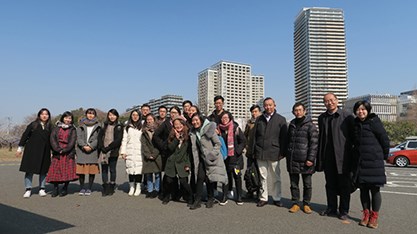
MLA students taking the class LA5303 (Urban Greening: Technologies and Techniques) visited Tokyo as part of a short-term exchange programme with Chiba University during the recess week. This year, NUS MLA students worked with Chiba University’s Landscape Architecture Department in the Graduate School of Horticulture, and landscape architecture students from Tsinghua University. Over the 10-day visit, students from the three universities worked on a small design project for landscape in Kashiwanoha Smart City. The overall context is that while technologies have made Kashiwanoha Smart City more sustainable and prepared for natural disasters, the landscapes seem to be under-emphasized in the overall strategic development of the city.The workshop requires students to analyse and demonstrate through landscape planning and design, ways in which landscapes can be aligned to the overall developmental objectives of the smart city, covering themes such as health and well-being, ecological enhancement, urban biodiversity, culture and identity, etc. The workshop culminated in a presentation with guest visitors from Kajima Corporation and Politechnico di Torino. In addition to the design project, students also attended a guided site visit by the landscape architect involved in the greenery planning and design of the city. There were also lectures from our industry guest visitor, and professors from Tsinghua and NUS. The trip also included site visits to notable greening projects in Tokyo, experimental and commercial plant factories in Chiba University, urban parks, and traditional Japanese Gardens.

The Department of Architecture is very pleased to announce the establishment of a university-level award, the “Gardens by the Bay Prize”. The Gardens by the Prize will be given to the top graduate of each cohort from the Master of Landscape Architecture programme. Said Prof Ho Puay Peng, Head of Department of Architecture: “We are very grateful to Gardens by the Bay for supporting our educational efforts to advance architecture in Singapore and the region. Gardens by the Bay has not only opened its scholarship to Master of Landscape Architecture students, it has also generously donated the prize to recognize the efforts of our students”. Mr Phan Yoke Fei, Senior Director, HR for Gardens by the Bay: “Gardens by the Bay takes pride in successfully blending greenery seamlessly within a bustling metropolis.We are deeply honoured to be associated with the Department of Architecture of NUS through this Award, as we believe the challenge of future sustainability will require Landscape Architects who are able to demonstrate versatility in integrating nature into their architectural design.”
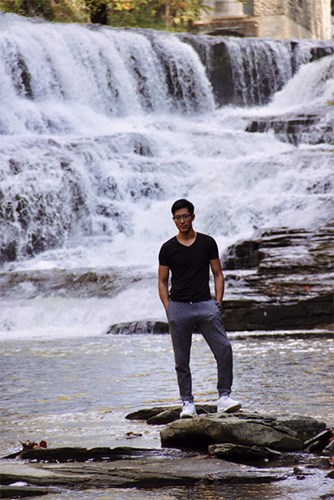
“I am really grateful for MLA programme of NUS to give me such a precious opportunity to enrich my education abroad. The experience in Cornell is so inspiring in terms of both academic and life experience. The Landscape Architecture department of Cornell University is in the College of Agriculture and Life Science, which is different from most universities. However, we can still get rich resources from College of Architecture, Art and Plaining. The setting of courses here is also flexible, allowing students to select courses based on their own preference. For studio, I selected the second year graduate studio. The campus is just amazingly beautiful. The main campus is located between two creeks, providing the students with peaceful and natural environment to enjoy the kingdom of knowledge, which is quite different from the city university campuses. The beautiful scenery here also gave me much inspiration for my hobby of painting. Thanks again for this opportunity and I benefit a lot from it in my life.” Junwei
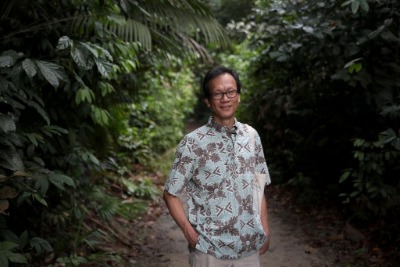
Dr Shawn Lum received the President’s Award 2017 for the Environment for his significant involvement in biodiversity projects in Singapore. Dr Lum has worked as an adjunct professor in Landscape since the inauguration of NUS MLA programme.
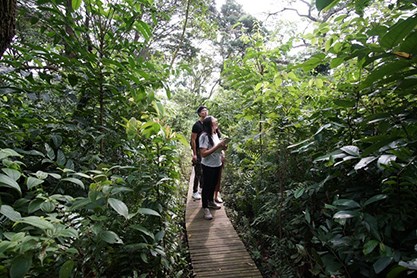
Assistant Professor Yun Hye Hwang received several prizes of LI awards 2017 and IFLA ASIA-PAC LA Awards 2017 for her projects in NUS campus. Award of Highly Commended under ‘Science, Management and Stewardship Award’ category ‘Less-maintained and high-diverse campus greenery in Singapore’ Award of Excellence under ‘Nature Conservation’ category – ‘From Lawn to Forest Garden’ (Ventus Naturalized garden) Award of Excellence under ‘Skyrise Greenery’ category – ‘Nature Refuge on Five Centimetres of Soil’(SDE roof)
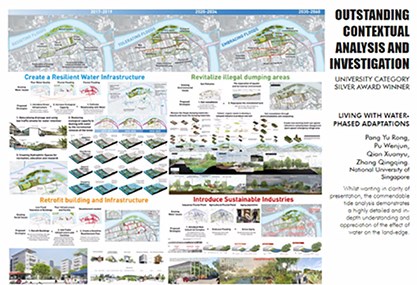
NUS MLA students won many prizes in different categories of the SILA Student Awards 2017. Congratulates all individual students and the winning team!
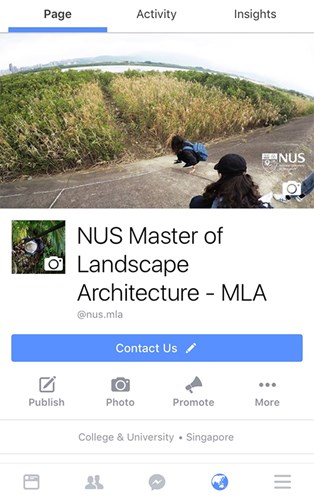
We announce the launch of our new Facebook Page. Through Facebook, we will share our activities in the Master of Landscape Architecture(MLA) programme and connect among alumni, current students, and future students. To follow us on Facebook, simply click here; then click “Like” at the top of the Page.
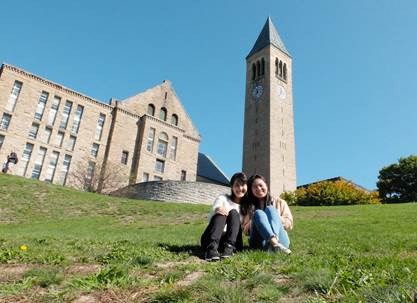
“..Our modules mostly involved going out in the field; from getting our hands dirty digging soil and obtaining water quality samples, to birdwatching with binoculars, and even camping overnight in a wooden cabin in the woods. We learnt representational techniques using a combination of GIS, Rhino and Grasshopper scripting to create analytical diagrams and maps. Working together with other disciplines in our projects, an experience that broadens our perspectives on environmental design..” from Pearlyn & Qing Qing
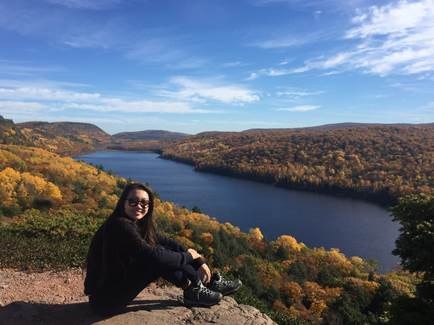
“…I am a first-year PhD student in Natural Resources and Environment at the University of Michigan, studying with Professor Joan Nassauer in the Landscape Ecology and Perception Lab. Currently, we are working on green infrastructure planning in the shrinking city of Detroit as a means of addressing problems and seizing opportunities associated with vacancy and aging urban infrastructure. Working in such a starkly contrasting urban context from Asia’s booming megacities not only broadens my knowledge, but also reveals to me the principles, concepts and approaches that are applicable across cultural and geographic boundaries….” from Yuanqiu
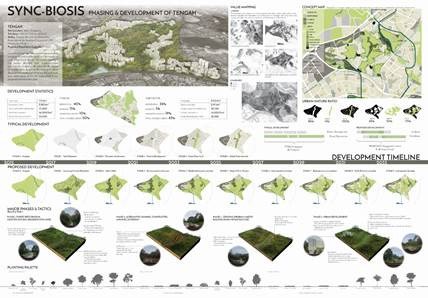
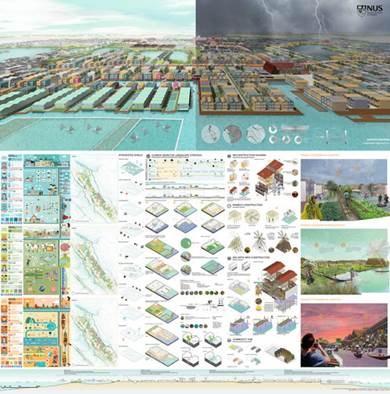
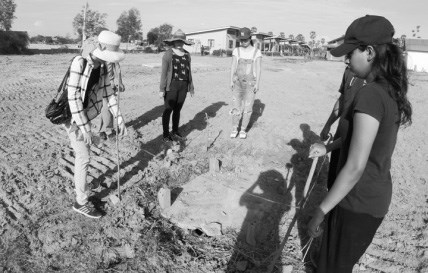
Smile Village, a community building project for 70 families evicted from slums was initiated in 2012 by Pour un Sourire d’Enfant (PSE) and Solutions to End Poverty (STEP). With the completion of shelter provision, the village moves towards the next stage of improving the livelihoods of beneficiaries through economically sustainable community development programmes. Five NUS MLA students participated in not only for plot design but also for hands-on construction process together with MyCorps, a Malaysian youth volunteering group.
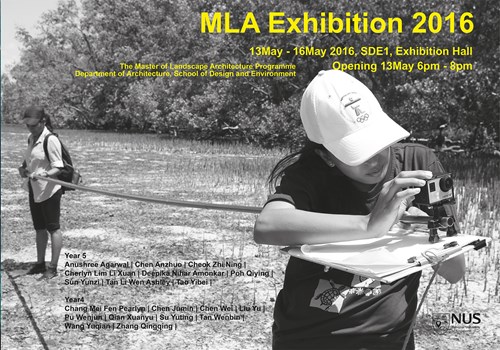
We would like to invite you to the opening event of MLA exhibition 2016. The exhibition showcases students’ works containing individual portfolios over 2 years of the master of landscape architecture (MLA) programme in NUS and video of highlights of MLA activities for the 2 years. Date: 13th May – 16th May 2016 Opening event: 13th May, 6-8pm Venue: Department of Architecture Exhibition Hall, SDE1 School of Design and Environment, NUS We very much look forward to seeing you.
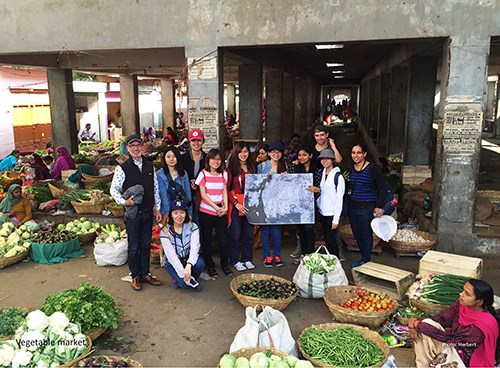
The graduating batch of MLA students completed a studio exploring the potential of landscapes to improve environmental quality and liveability for the walled city of Udaipur, one of the first twenty cities selected for the first phase of India’s Smart Cities mission. Check out what the students have done in this video link (short film for the City of Udaipur). This studio was sponsored by the Ramboll Foundation.
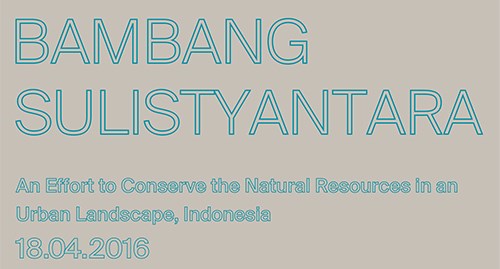
This lecture will deliver the research results of some case studies in Indonesia, concerning on the following aspects: Management of urban trees and inventory method Open space valuation on its capacity to reduce infrastructure construction in order to mitigate stormwater runoff Mangrove forest conservation approaches at Nusakambangan, Central Java Benefits of roadside trees along highways to reduce air pollution Ecosystem change prediction based on climatic data at Lombok Island.
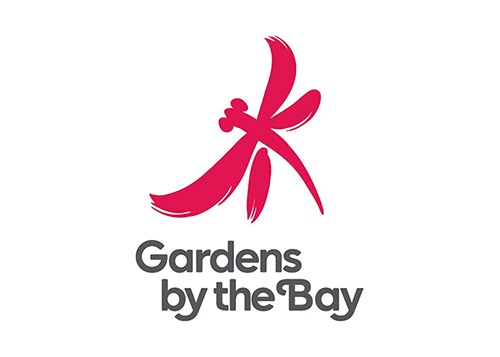
The Gardens by the Bay is now receiving applications for its scholarship programme. B.Arch students in their third who intend to pursue Master of Landscape Architecture, and B.Arch students in their fourth year who are taking the preparatory year of the Master of Landscape Architecture programme are eligible to apply. Please note that terms and conditions apply and further information can be obtained from this link. Enquiries should also be directed to Gardens by the Bay. Also see Scholarships
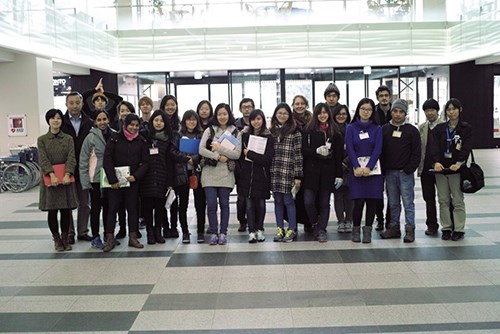
MLA students taking the class LA5303 (Urban Greening: Technologies and Techniques) visited Tokyo as part of a short-term exchange programme with Chiba University during the recess week. This is the third run of the joint programme with Chiba University’s Graduate School of Engineering, Graduate School of Horticulture, and Center for Environment, Health and Field Sciences. Over the 10-day visit, students from both universities worked on a small design project for greening of Chiba University Hospital with the objective of improving the planning and design of green spaces in the hospital to encourage better healing spaces for patients, restorative spaces for staff, enhance the hospital identity, environmental performance, and social connection with surrounding communities. The design workshop culminated in presentation to hospital and university staff, including the Director-General (CEO) of the hospital and Vice President of Chiba University. In addition to the workshop, students visited notable greening projects in Tokyo, experimental and commercial plant factories in Chiba University, and traditional Japanese Gardens.
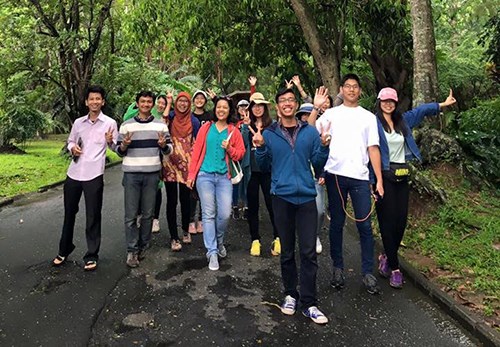
For AY2015/2016’s second semester design studio, fourth-year MLA students worked in Sukabumi, Indonesia, and considered design responses to peri-urban landscapes and oil palm plantations. In our first collaboration with landscape architecture faculty and students from Bogor Agricultural University (IPB), we worked on an urbanizing village (Desa Warnajati) adjacent to a large oil palm plantation.
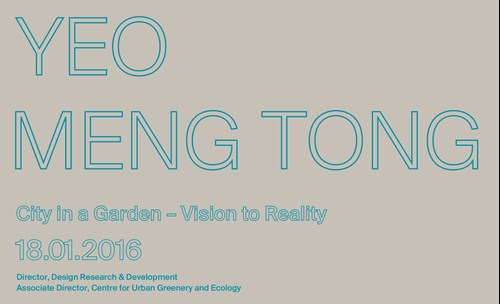
Greenery and parks are not just places where one can enjoy nature, but they also provide us with fresh air and a pleasant living environment. The greening of Singapore has always been a crucial part of our nation building. Like other infrastructure developments, the development of greenery needs to be sustainable and integrated with other developments for the greater good of Singapore. This presentation will share how greenery used to be like in Singapore, how it is now, and our aims for the future
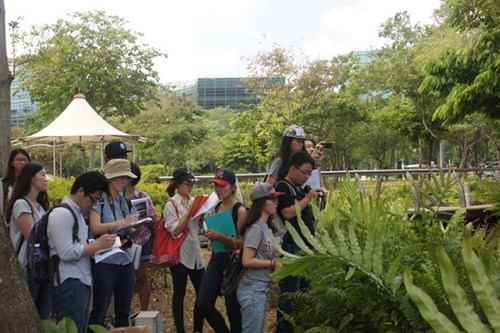
NUS and Chiba University students on a visit to study site at Changi Business Park for a joint design workshop undertaken as part of the module Urban Greening: Technologies and Techniques. A project sponsored by JTC Corporation, the workshop focused on the potential of landscapes in a conventional business park in Singapore by understanding hidden social and ecological connections between the site and adjacent land uses and communities, as well as the needs of office workers in the site.
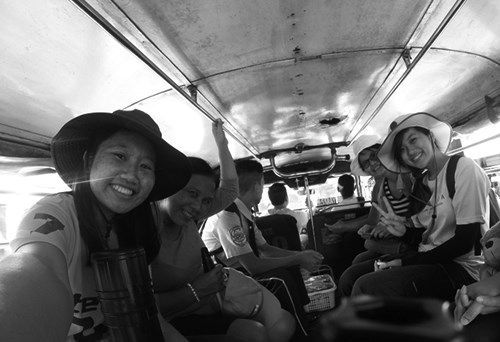
12 students in NUS MLA programme visited City of San Jose del Monte, as a part of the module MLA Studio: City – for proposing urban revitalization strategies for a low-income community. The Six-day field trip aimed to understand site context through intensive research activities including data collection, site observation, measurements, interviews, and mappings. Two local partners, the city of San Jose Del Monte and Enpraxis guided and provided grounded- perspectives that raised awareness of the economic, social, and cultural situations of low-income developments in the city.
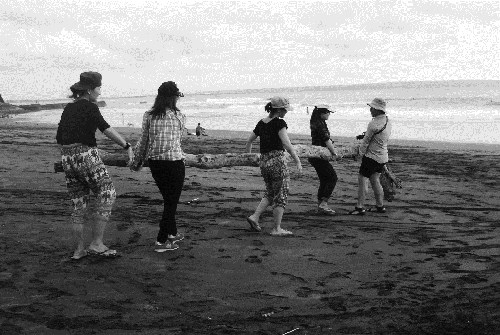
Eleven second-year students from the MLA programme went for a 10-day field trip to Bali, Indonesia to study the effects of tourism and urbanization on the traditional agricultural landscape. This final-year studio was based in Canggu, a fast-urbanizing desa (‘village’) located near popular tourist destinations such as Kuta and Seminyak. The team sought to understand development patterns and their impacts, and offer realistic point solutions to the various landscape issues identified.
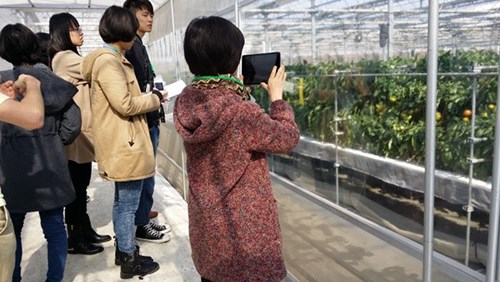
NUS students on a study visit to a research facility in Chiba University on intensive urban agriculture production systems, which showcases a range of production systems from conventional greenhouse to fully automated plant factories that are developed for production, retail and disaster relief operations. This visit is undertaken as part of the module Urban Greening: Technologies and Techniques, during which NUS students participate in joint workshop with students from Chiba University. Each university hosts a workshop in alternate years, allowing students to take advantage of cross-cultural and contextual learning in the approach to the design of urban landscapes.
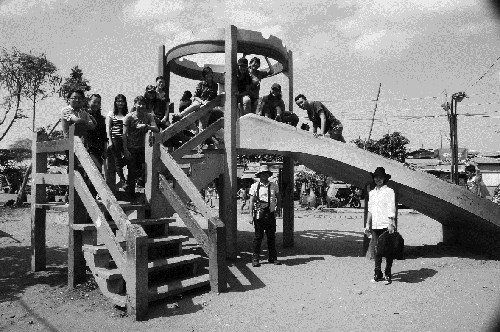
Under the theme of ‘Food, Shelter & Livelihood’, twelve first-year MLA students left for Manila to conduct field work for their second-semester studio. The project site was set in BASECO, a landfill at the bay of the City of Manila, currently occupied by the urban poor as well as new rural immigrants living in difficult conditions. Facilitated by NGO partners such as Gawad Kalinga and Urban Poor Associates, students were able to gather detailed site information through interviews, mappings and photographic documentation. The collected data would in turn be used to inform landscape strategies for improving liveability in these conditions.
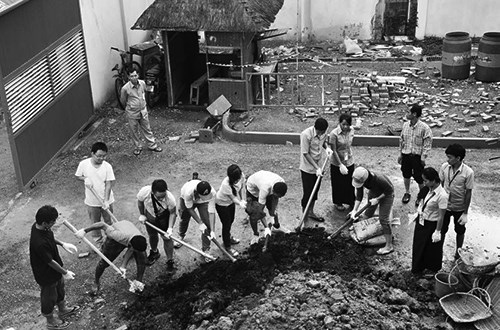
As part of the NUS Landscape bridging course, twelve MLA students visited the Pour un Sourire d’Enfant (PSE) school in Phnom Penh, Cambodia, along with other NUS participants. Students were tasked to develop an edible landscape concept for the PSE School, whose student population largely comprises the urban poor, living in and around a large dumpsite. Through field work and interactions with local students and partners, the NUS participants collected site information for their design work, and also gained awareness of the urgent socio-economic problems confronting the urban poor in Phnom Penh.